IOS organises two-day National Conference on “Indian Muslims and Plural Society”
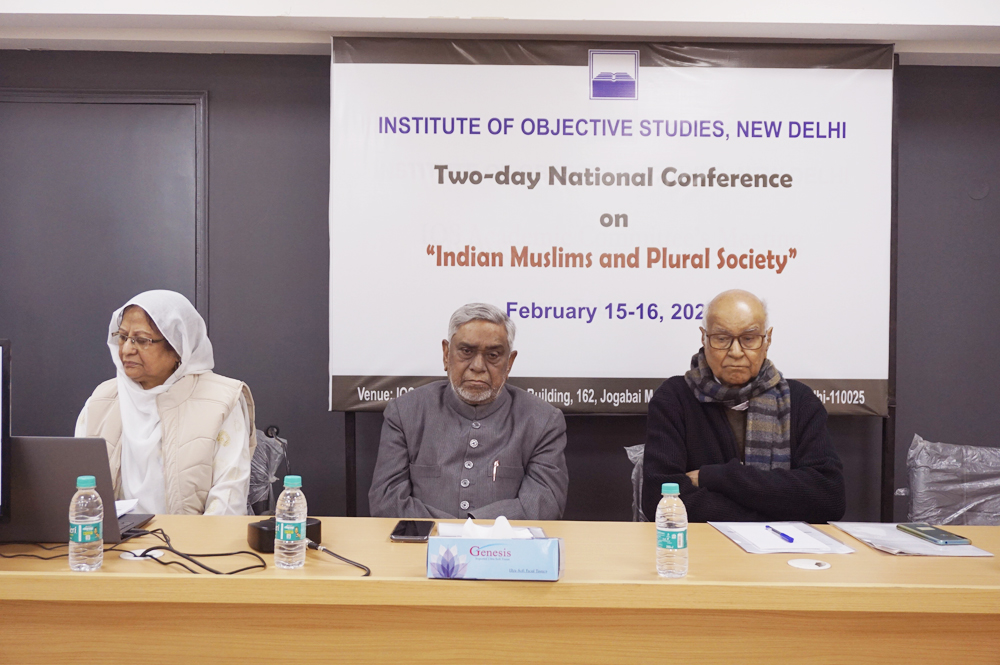
IOS organises two-day National Conference on “Indian Muslims and Plural Society”
New Delhi, February 15-16, 2023: Institute of Objective Studies, New Delhi, organised a two-day National Conference on “Indian Muslims and Plural Society” in hybrid mode from February 15 - 16, 2023. The conference was held in multiple sessions and concluded with adoption of six resolutions in its concluding session.
Inaugural Session
The inaugural session of the conference commenced with the recitation of verses from the Holy Qur'an by Maulana Athar Hussain Nadwi from IOS Urdu Section, along with its Urdu translation.
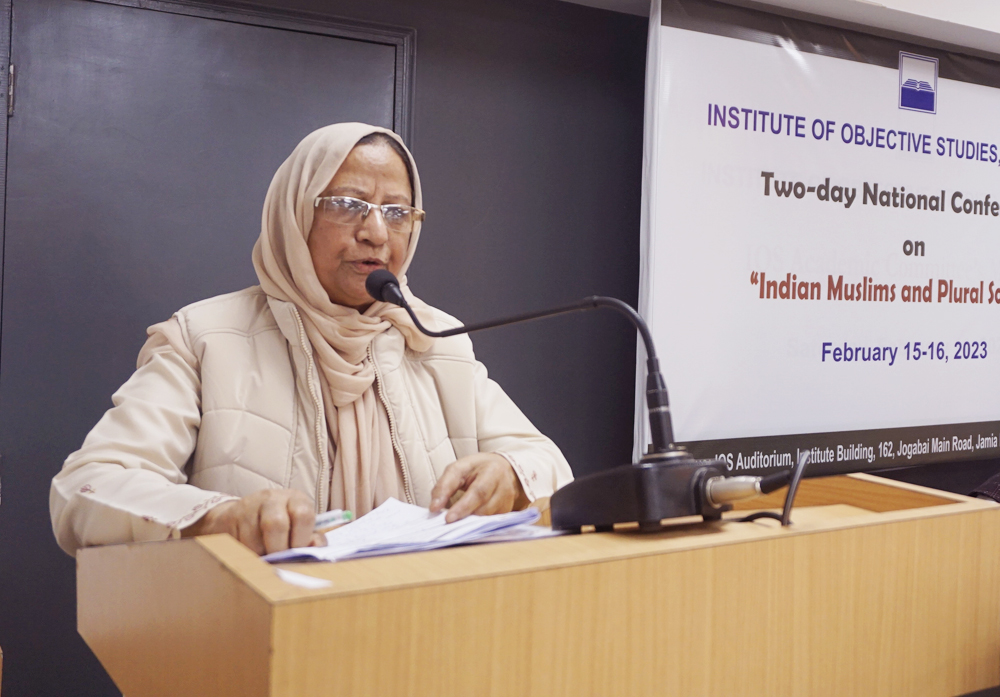
Professor Haseena Hashia, Assistant Secretary General, IOS, while welcoming the guests and participants, introduced the IOS, which was established in 1986. “It has been successfully progressing since its establishment. It ceaselessly fulfils the primary motive to promote research, publishing books and much more, including awarding scholarships to deserving students and urging social welfare programmes as focal areas for objective and consistent growth of Indian societies—predominantly Muslim minorities by promoting intellectual discourse and dialogue” she said.
She talked about India's multicultural identity and how Indian societies are cordial as propagators of coexistence as people live in its diversity of plural society where different faiths coexist together. As Indian Muslims, with their identities as the most significant minority in the country, they represent unity in diversity, she said.
The IOS has taken several notable initiatives to ascertain minority upliftment besides its active involvement in many collaborative efforts that paved the way for marginalized Indian societies to attain significant positions, she said. She further said that the IOS' 5 chapters and 23 academic committees are significantly contributing for the advancement of the objectives of the Institute. The Institute has brought more than 400 publications by now. It also publishes two bilingual journals intending to promote research practices, she concluded.
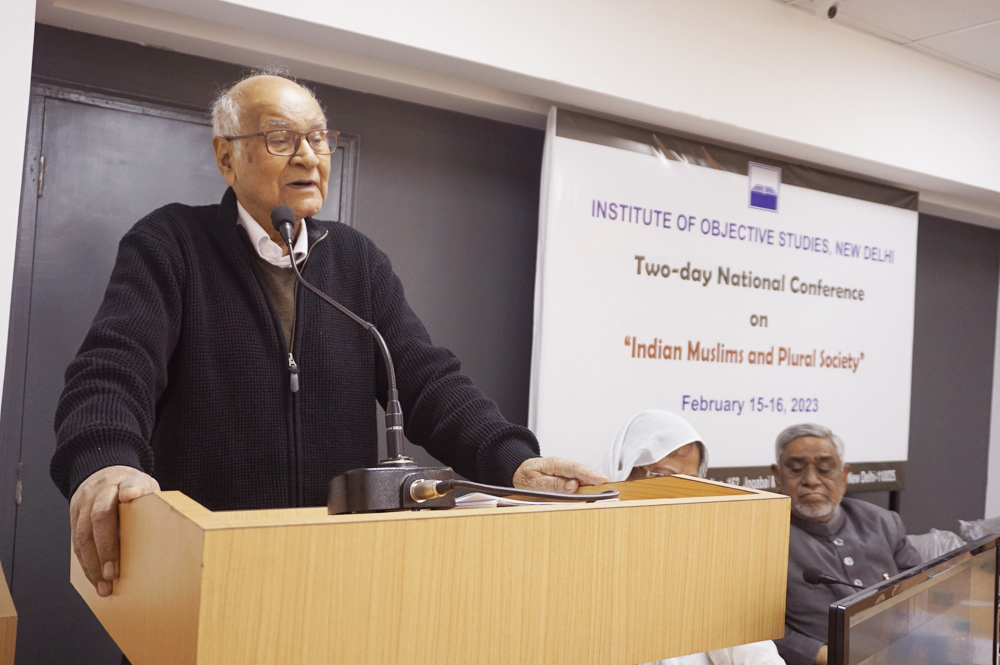
Professor M.H Qureshi, eminent Geographer of India and retired Professor of Geography, CSRD, New Delhi, in his inaugural address spoke about the diversity in India. He talked about India witnessing constant and numerous migrations over the last centuries. The human race worldwide, including the Indian subcontinent, saw land diversity for centuries. It is diverse and brought and strengthened the socio-cultural variety of regions. We have Nordics, Mediterranean, and Mongols—people from Central Asia, Persia and even Arabs who arrived in India through its southern-western coastal region. Therefore, India has immense diversity, he said.
He further said that the traders and invaders brought diversity to India while coming from different parts of the world. People moved, thus multi-cultures and even products in use moved, he noted. He said that the Arabs came to the Kerala coast and brought many traditions that became part and parcel of India. Allah created and gave us ample creative elements to develop and manipulate things, he stressed.
Prof. Qureshi quoted Allama Iqbal’s Persian poetry to explain how God created us and guided us to design something for our growth through human contribution. Ironically, we use them for self-destruction in the race for supremacy. The creator empowered us to remain pluralistic. Our adjustments are different as humans are manipulative and yet distinct. Societies are vertically varied and diverse. Resources and technologies play a crucial role in it. We have differentiations, pluralities and diversities, and multiple faiths that coexist due to our plurality. Oneness within the variegated beliefs does matter in Indian societies. Likewise, Vedas describe truth as one. Symbolic differentiation is relatively specific identities. Sufism sometimes rejects symbols. Guru Nanak emphasized preparing a sacred thread. There is no difference between Sufism and Sikhism. People are similar thinkers, although different, making them pluralistic, he concluded.
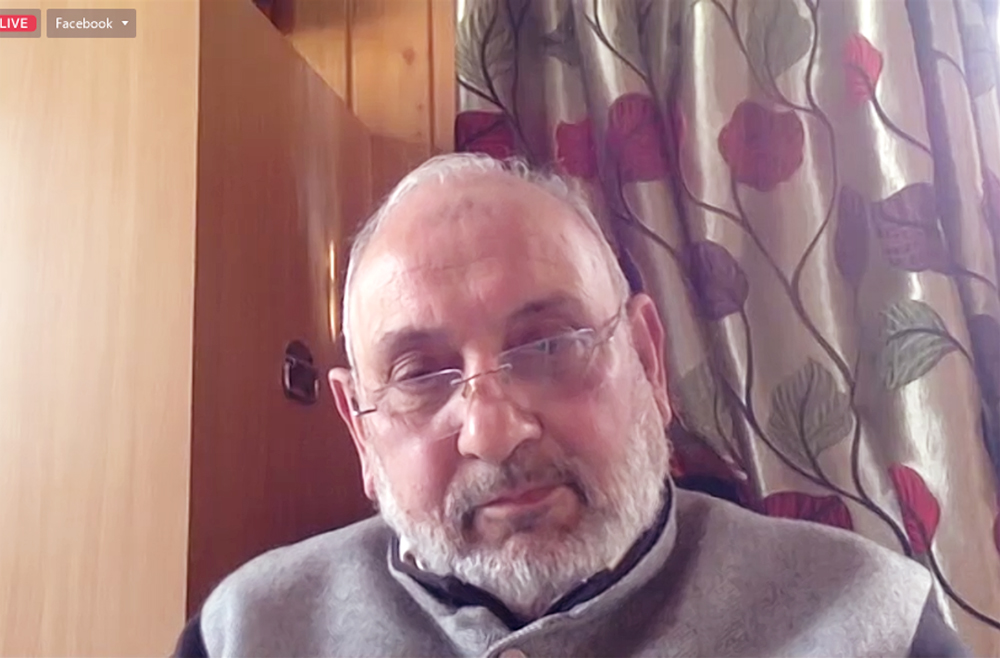
Professor Mehrajuddin Mir, former Vice-Chancellor of the Central University of Kashmir, while delivering his keynote address said that the IOS aptly identified a significant theme for the conference as it was the need of the hour. The concept of pluralism was how to live together, tolerate others’ thoughts and ideas, and even understand opponents’ miseries for solutions to live in diversity, he said. All religions worldwide have various sects, and thus, their practices differ. The conflicts are, therefore, intra-religious, interreligious and social, yet we remain plural, he noted.
He said that the roots of pluralism were solid in ancient India and the rest periods. The British couldn’t damage Indian culture but induced Western culture into it. After India’s independence, our visionary leaders tried to sustain Indian culture. But partition brought a deterrence to damage Indian societies further. He further said that India is still home to many significant world religions, making it a plural society. It revives the concept of tolerance and sustenance.
Professor Mir quoted current Indian Defence Minister, Rajnath Singh, who recently spoke about how one Imam and one Pandit shaped his career to understand brotherhood and oneness. He also mentioned the caveat that our pluralistic societies are damaging due to nuclear families. Even five people in a family can’t live in one home today. It was a matter of great concern, he wondered.
The International Human Rights Commission giving emphasis on higher education also conveys that we must learn to live together. In the 20th century, we witnessed many conflicts based on religion, caste, creed, and border disputes. It has instead been the most criminal century ever, he observed.

Professor Akhtarul Wasey, former President, Maulana Azad University, Jodhpur, Rajasthan, in his Presidential Address, said that Muslims came to India as traders and invaders. But once they came here, they delved into the culture and traditions of India and became one who enriched the nation to encourage pluralism here. Muslims have always contributed to India’s prosperity. They gave Qutub heights to the beauty of the Taj Mahal and much more besides their notable roles in the independence struggle from British colonial rule, he said.
He said that how Dr. APJ Abdul Kalam became a global personality of Indian origin—a Muslim. The country couldn’t think of its missile programme without his theoretical contributions, he said. Another example is Ayurveda, given a new identity in India by Himalayas, which a Muslim runs. The list is endless. All fields, including music, art, paintings and films, etc., witnessed notable roles of Muslims in India.
He said that Allah sent prophets for communication and not for conversion. He further said that humans are well adept, and if God willing, they can gain the right path. India is a pluralistic yet exciting nation. Take, for example, an Indian Muslim from Kashmir and his counterpart in Kerala. Different yet, they are Muslims, like Muslims from Bengal, Tamil Nadu, or Gujarat, who remain culturally diverse, although they are Muslims. India is also pluralistic in terms of variegated languages. The country has accepted linguistic diversity to its core, he noted.
He said that India’s different religious traditions bring us to a close rather than distancing, although some people try to destabilise that plurality. Muslims will forever remain vibrant every time because if we faced many of the troubles in the past, from Karbala to numerous other hardships, no new problem could bother us. After all, we always have Allah’s mercy, he said. India is a pluralistic nation but not a racist one. Muslims have always tried for India to grow and prosper, and they will do the same in the future, he concluded.
Professor Haseena Hashia proposed the vote of thanks before the formal commencement of the first Technical Session.
.jpg)
Technical Session I
The 1st Technical Session began with the theme, “Genesis of Pluralism in India.” Professor Arshi Khan, Department of Political Science, AMU, Aligarh, as Moderator & Chairperson, invited the speakers to express their views in the session.
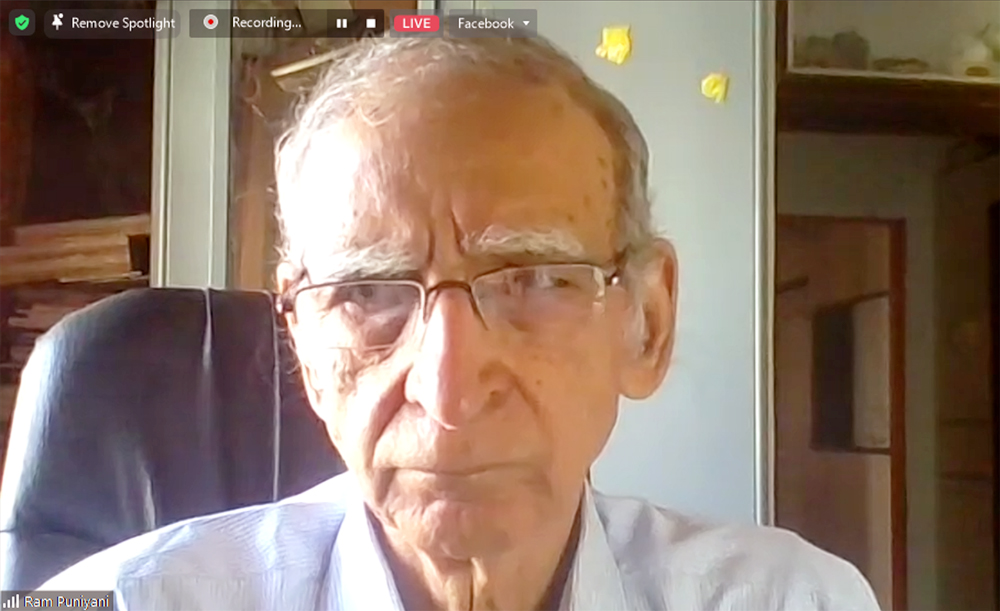
Dr. Ram Puniyani, Human Rights Activist and Writer, said, “there is a misconception in the country, especially against Muslims.” The alliance of civilizations defines plurality. Religions don't have any nationality. They are universal. Some bigots wrongly present Islam in India; otherwise, it is peaceful. The Kings in India, whether Muslim or Hindu Kings, ruled the nation for centuries with people of different faiths as their core governance teams. There was nothing like Muslim Kings or Hindu kings then, he explained.
He observed that calling Indian cultures as Hindu culture is an entirely wrong and bigoted idea. Leaders like Jawaharlal Nehru, Mahatma Gandhi and Maulana Abul Kalam Azad brought secular spirits into the country. We have Sufi and Bhakti traditions that describe the morality of religions and humanity in India. The writings of Mahatma Gandhi shed more light on our secular culture. Hindu subjects having Muslim rulers and vice versa mattered the most for peaceful coexistence in the past, he said.
When Kofi Anan was Secretary General of the United Nations, a UN report advocated for the alliance of civilizations for the development of cultures. Nationalism against religion is a damaging agenda that further deteriorates different communities and their community spirit especially Muslims and Christians in India, he emphasised.
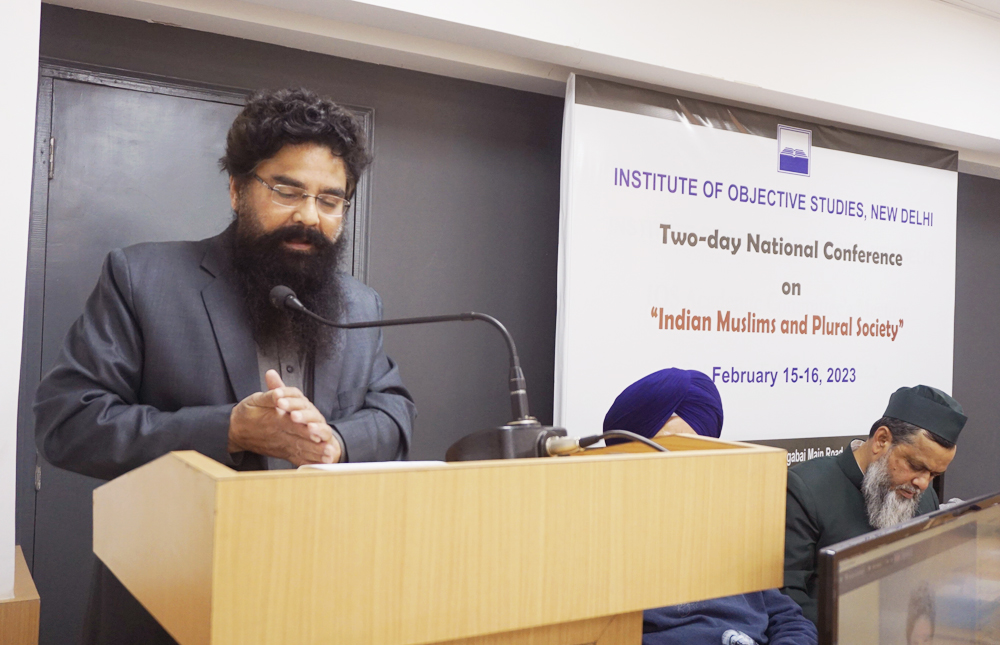
Professor Mohammad Sohrab, MMA Jauhar Academy of International Studies, Jamia Millia Islamia, New Delhi, who was the second speaker in the session, described Pluralism as a definition both from a conceptual and theoretical perspective. Primarily a religious and moral philosophy, Pluralism was the acceptance of diversity. It is more than tolerance of differences, he said. The conception of ‘We’ was essential to assess Pluralism through organic social bonding. Pluralism in the Islamic context of acceptance and the country's scenario today should be understood in the context of how the nation's spirit developed in Madinah during the time of the Prophet (PBUH), he elaborated.
He said that the concept of gender justice, fraternity and how to deal with others in the context of the Islamic faith is understood globally. Spain was the first in Europe that focused on dignity in pluralism fabric. Before Judeo-Christian, Spain was more prosperous and satisfied in the Islamic-Christian era. Such spirit had already developed in Madinah. Shaping the legal system is the beauty of Islamic civilizations. It was hardly recognized in Europe, which Islam brought there. Pluralism demands that your neighbour be considered an asset, not a liability. Diversity with Pluralism creates resilience, but diversity without Pluralism brings disaster, he concluded.
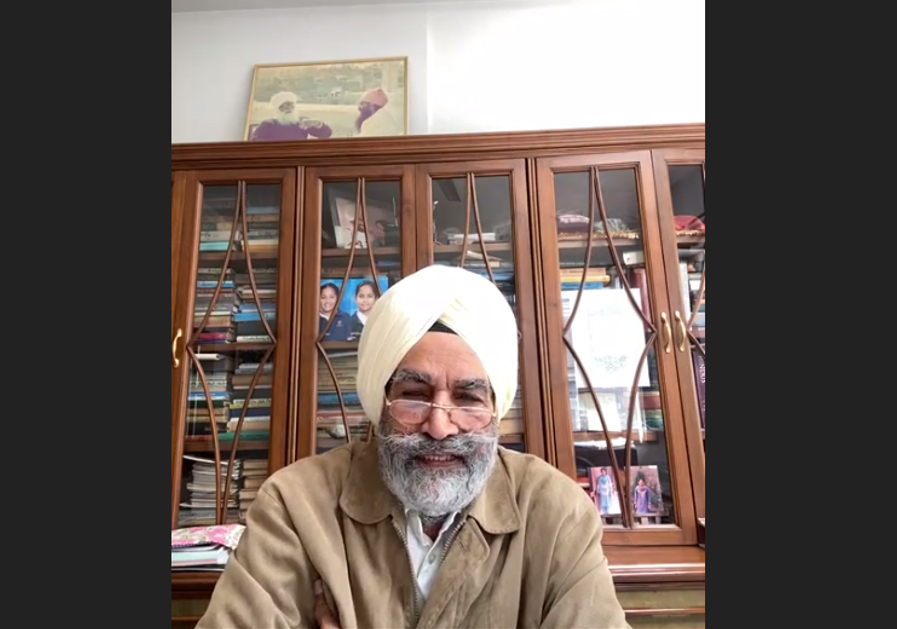
Mr. Gurtej Singh, IAS, Chandigarh, Punjab, who was the third speaker of the session, spoke that how India's constitutional and political federalism paved the way for the Constitution, giving lots of autonomy to the country. The atrocities upon Sikhs and their resistance were part of history, he said. The examples of Pluralism can be understood from the Guru Granth of Sikh religion. Conflicting societies hardly respect the constitutional beauty of India. Leaders like Jawaharlal Nehru and Maulana Azad to KM Munshi et al., shaped the nation and its pluralistic spirit.
Indian Muslims rejected Jinnah, were confined to religious partition and accepted a pluralistic social fabric, he said. His book Sikh and Indian Civilization further sheds light on how Sikhs were projected during partition. He informed that law and order situation in Punjab were far better than in any other place in India, but situations transformed due to one reason or the other. The world has become a global village today, and India needs the blessings of the majority of Hindus to ensure plurality maintains when all minorities coexist with peace and prosperity, he said.
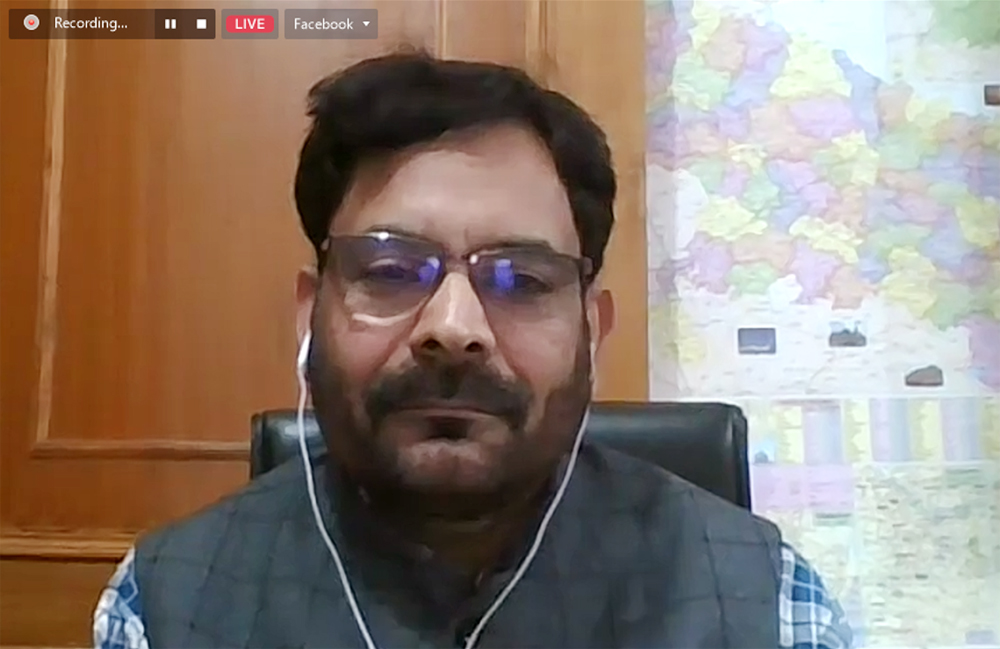
Mr. Sanjay K. Rai, a Social Activist from Lucknow and the 4th speaker of the Session, mentioned that “diversity doesn't accept dictators”. He highlighted the importance of multicultural societies. He said that Linguistic Pluralism was the need of the hour in today’s context. He said that societies with pluralism also impact by technological growth. Communities can’t be defined through one particular race or culture only. It requires collaborative development, he said. He further said that those breaking plural societies have instead destroyed their societies. He said that general public needed a pluralistic approach to grow and prosper. He said that the UN respects global cultures and traditions, including different food habits. He felt that there can't be nation-building and growth without taking Muslims along who constitute 15-20% population in India. The One Nation, One Culture concept can only work in some countries. One can’t find books on Hitler in Germany today. Mosolini's home has been destroyed in his country as people don't want him to be remembered. It symbolizes how those going against Pluralism perish from the leaflets of history, he concluded.
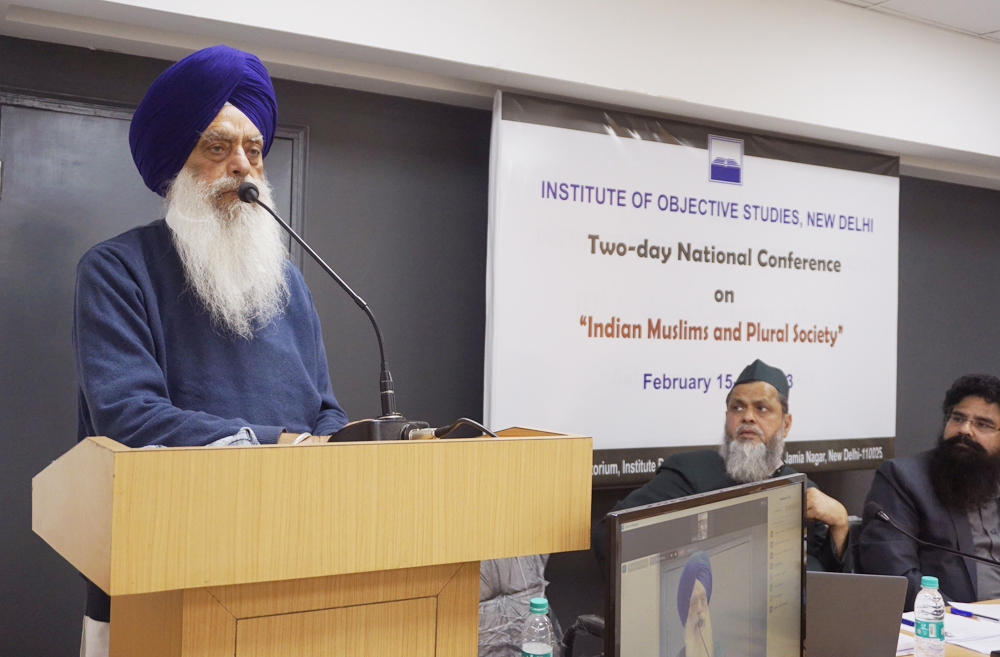
Mr. Gurdeep Singh, a Sikh leader from Bhatinda, Punjab, as the 5th speaker of the session, stressed that it was high time to focus on future, in view of the experiences of the past and present to grow in a plural society. Mistakes could be there in the past, but remembering those only won't solve the purpose. It will hinder progress, he said. He warned that today's rulers in India were breaking the very ascent of Indian culture and unity. Rulers must showcase justice which Guru Granth conveyed, he opined.
He said that when Kashmiri Muslims are tortured, others in the country feel their pain. They shouldn't feel like what is presumed but think of justice for humanity, irrespective of the religious faith they follow, he said. He suggested IOS to initiate an analytical study of the plights of Punjabis as well, and come to Chandigarh to support us in eradicating our dilemmas with intellectual initiatives.
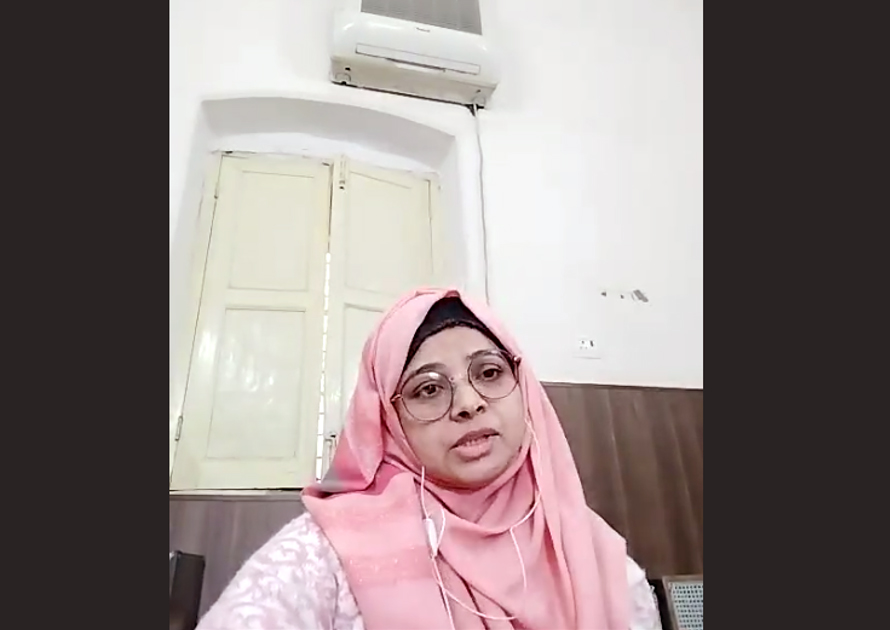
Dr. Lubna Naaz from the Department of Islamic Studies, Women's College, AMU, Aligarh, who was the last speaker of the session, spoke on the topic, “An Islamic Perspective on Peaceful Coexistence.” She stressed that the concept of peace in Islam should be adopted for peaceful coexistence. The role of Islam in securing social justice is that Allah didn't create diversity as a source of destruction but guided for oneness in diversity, she said.
Freedom from injustice, spiritual, intellectual and mental development and living with people of other religions for a peaceful existence is the message of Islam, she said. Nurturing love, respect and respectful living are the core messages. Respect and kindness are the messages gained from the Islamic concept through Qur'an. Peaceful coexistence and living with various ideologies are all necessary, she concluded.
The session concluded with a question & answer followed by a formal vote of thanks proposed by Professor Haseena Hashia.

Technical Session-II
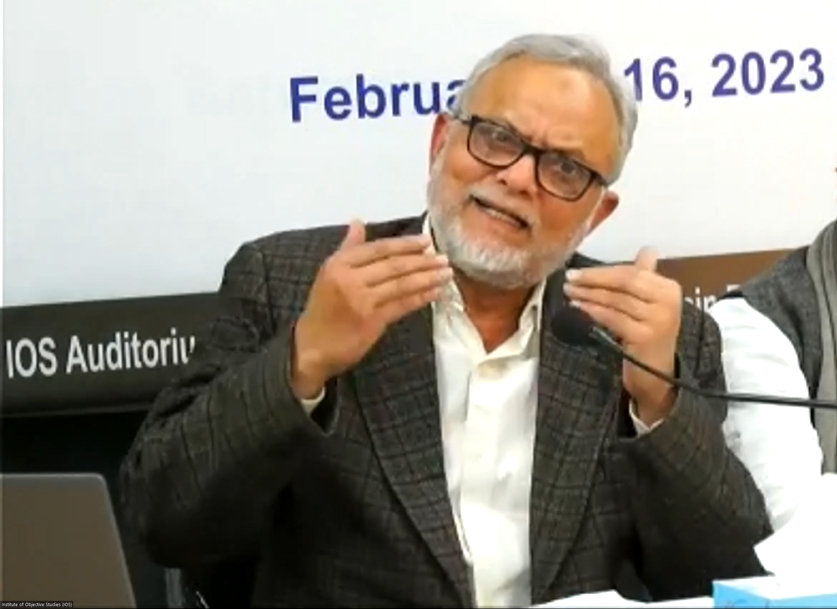
Focused on the theme, Role of Islam to Strengthen Pluralism in India, the Technical Session II started under the Chairperson, Professor M. Ishaque from the Department of Islamic Studies, Jamia Millia Islamia, New Delhi.
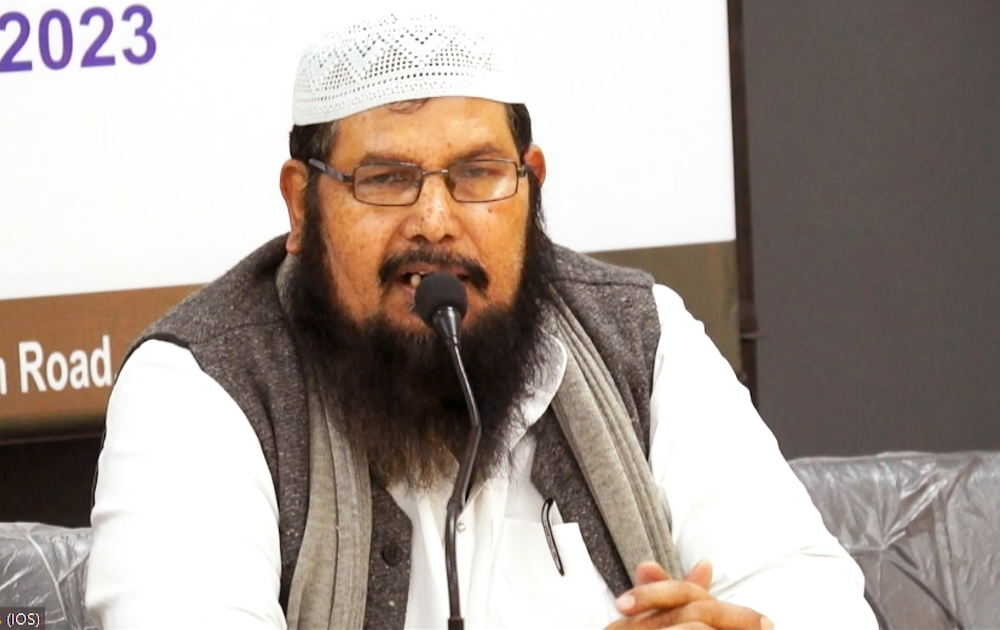
The key speaker of this session was Maulana Abdul Hameed Nomani, Former General Secretary, All India Muslim Majlis-e-Mushawarat, Delhi. He highlighted that two things are required to be properly understood: the Creator, and the Creator's motive. He said that Sufis always made one feel the independence to think and lead life. Islam always propagates the rights of neighbours, relatives and much more. Sufi Khwaja Moinuddin Chisti was wearing similar dresses like Indian Sadhus did to ascertain people of his time, irrespective of their religious faiths, connected with him.
He said that Swami Dayanand and Raja Ram Mohan Roy kept Hindu philosophy out of their movements but promoted social reforms in the societies applicable to all faiths for social betterment. “Faith is vital, like Allah's mercy, unlike social practices that change with time”, he said. He further said that India's beauty was in its diversity of religious thoughts. In pre-Islam Arab tribes kept fighting for generations on a single issue of their forefathers, but the scenario has changed. Islam accepts variety in pluralism, from religious to traditional to social practices. Islam as a religion must not change its basic principles. It is a Sanatan religion with firm principles, he concluded.
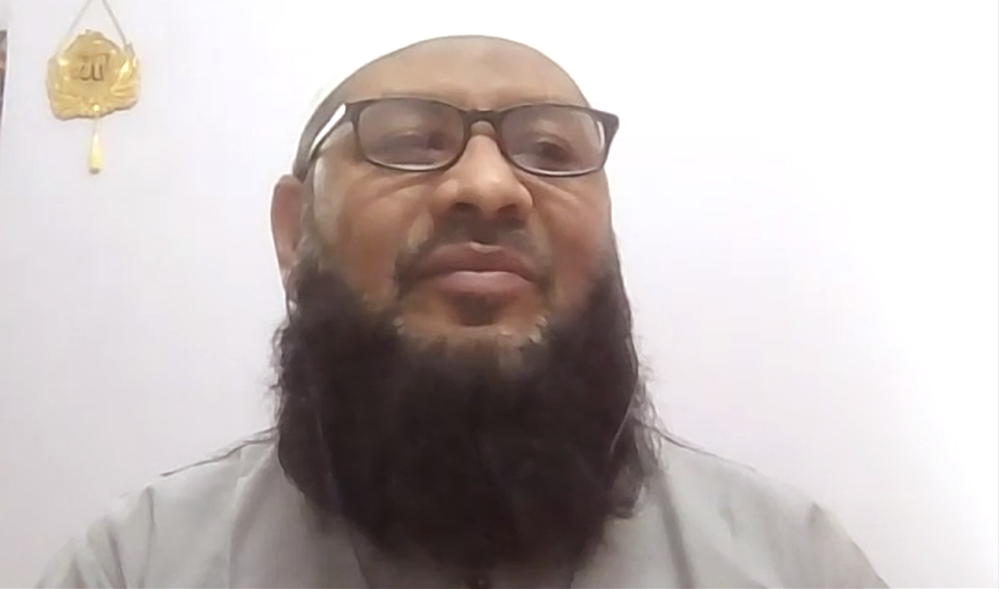
The second speaker of the session, Professor Faheem Akhtar Nadvi, Head of the Department of Islamic Studies, MANUU, Hyderabad, emphasized that the role of Islam in strengthening pluralism in India is vital. Pluralism is a society where people of all religions reside and respect each other, he noted. Minorities must be respected, and India is one of the best examples of that, where pluralism has stayed for centuries, he said. He emphasized that India will grow only when pluralism is projected in practice. He quoted Qur'an saying that all humans should be respected, regardless of their faith. No one has the right to degrade someone as an individual or someone's faith. He further said that Qur'an says you don't curse those who make a mockery of your religion. Don't use foul language. Islam doesn't accept unnecessary enforcement for religious adoption. He said that we must admit the fact that today people don't know each other's religion. It is time they know each other because ignorance propagates vested interests. It’s time we learn about others religions too. Pluralism will be empowered in India by doing so, he opined.

Professor Hamid Naseem Rafiabadi, Head of the Department of Islamic Studies, Central University of Kashmir, spoke on the role of Islam in strengthening pluralism in India. Pluralism is a reality today, and no country can escape it, he said. He highlighted how the Prophet of Islam (PBUH) reached out to Jews and Christians and showcased the message of Pluralism before them, which resultantly described the beauty of Islam rather. Piety and pluralistic vision are for all, not to be categorized as majority, minority or men and women, he emphasised.
He stressed the need to begin dialogues and communicate to bring pluralistic ethics to our communities. Sufis like Baba Farid projected Pluralism and advocated that. Religiosity to spirituality and vice versa strengthens societies. Action and character matter rather than race or biases. It's necessary to think with an integrated rather than an isolated approach. And Allah gives this message. Islam is a pluralist religion and accommodative, he concluded.
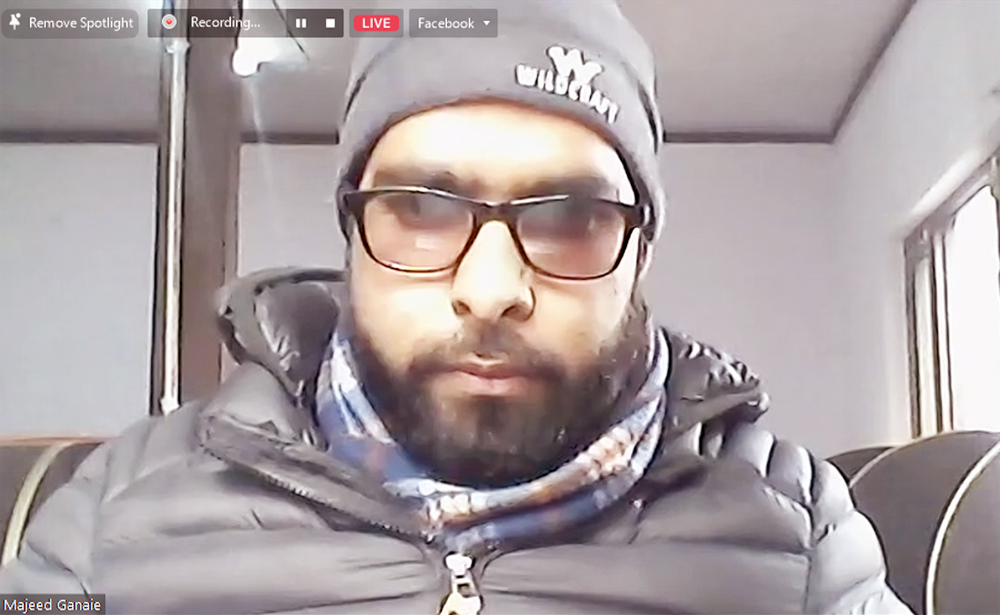
Ab Majeed Ganaie & Iymen Nazir, Doctoral Candidate, Department of Religious Studies, Central University of Kashmir, presented their paper jointly on the “Islamic Perspectives of Pluralism with Special Reference to India”. They emphasised that the role of Islam in strengthening Pluralism in India remains vital. Their paper on Pluralism from an Islamic perspective and diversity highlighted how Pluralism is a situation when different classes and races live together and coexist. It is inclusiveness rather than an exclusiveness concept. Qur’an insists we think of our origin and coexist. We can’t make distinctions between the prophets and their generations, they said.
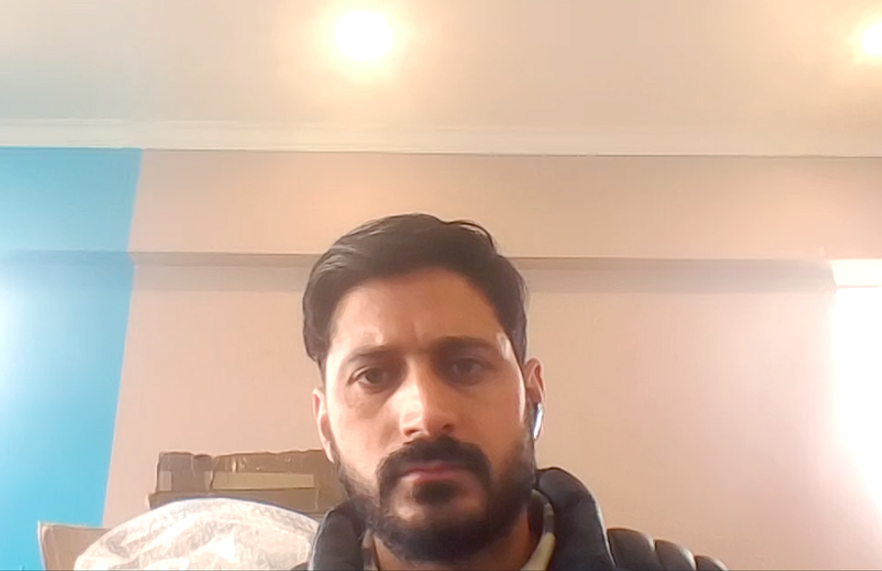
The 5th speaker of the Session, Mr. Javid Ahmad Bhat, Manager KSG, An Institute of IAS Exam, Bhagat, Srinagar, spoke on the topic, ‘Prophet Muhammad (PBUH); the ultimate Guide to Promote Pluralism and Peaceful Coexistence Among Nations’. He said that Prophet Muhammad (PBUH) was the ultimate guide to Pluralism. Islam is solely and wholly a peaceful religion, and the Prophet spreads the message of peace. He avoided the wars until that was needed. He avoided wars for the betterment of humanity, he observed.
In Makkah, the Prophet (PBUH), asked his companions to do Jihad with the Qur’an to spread the message of peace and affinity with religious freedom and humanity kept at par. He never compelled people to accept Islam but advocated spreading its message of justice and equality. The peace model of Prophet Muhammad (PBUH) is more relevant and vital in the Indian context, he said.
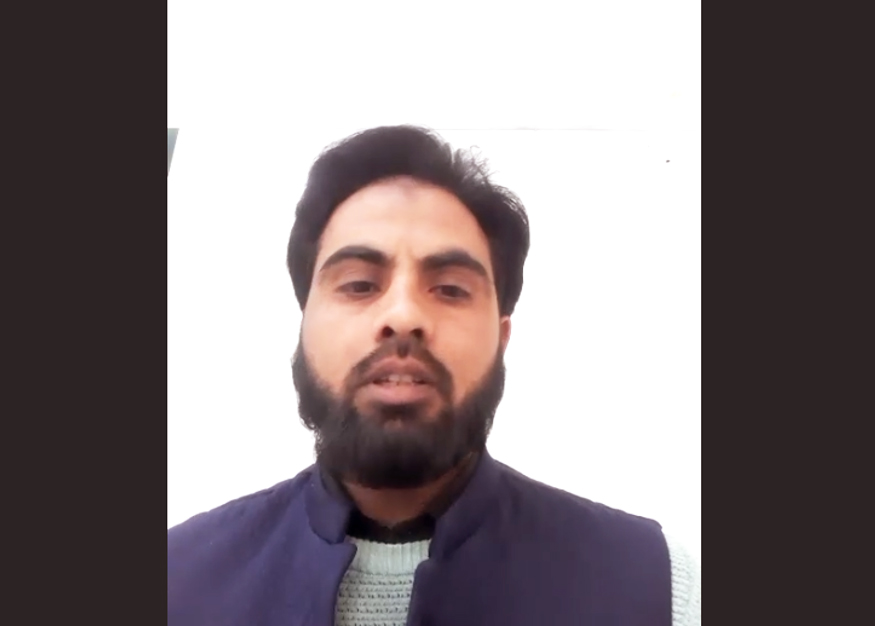
Mr. Mohd Azam, a Research scholar at the Department of Islamic Studies, Baba Ghulam Shah Badshah University Rajouri, spoke on the topic, “Role of Chishtiya Order in Promoting Pluralism in the Indian Subcontinent.” He said that the role of Sufi orders in Pluralism in the Indian subcontinent needs to be understood in the current context. He further said that several Sufi orders propagated Islamic teachings, Pluralism and human values in the region. Sufism became popular after the 8th century, and the Sufi orders in the Indian content played a crucial role in the following centuries. It is time to revive the various Sufi practices that advocate Pluralism and coexistence, he observed.
While concluding the session, Professor M., Ishaque in his presidential remarks highlighted the idea of pluralism in modern and recent times. He said that it became popular in the 1930s and that earlier the concept was less popular. Religious teachings guide the teachings of truth. All prophets brought the same message of the diversity of the truth, he said.
Do Islam and fundamentalism reject Pluralism?, he questioned. He said that many such points need to be discussed in the current context. For example, Raja Man Singh’s sisters were married to Muslims, and his father built a mosque in Lahore. All Muslims in their service were supposed to pray. But the Raja was a Hindu. He didn't become a Muslim, though, and when asked, he would say perhaps my heart is sealed. It is an excellent example of Pluralism, he said.
The session ended with a vote of thanks proposed by Professor Haseena Hashia.
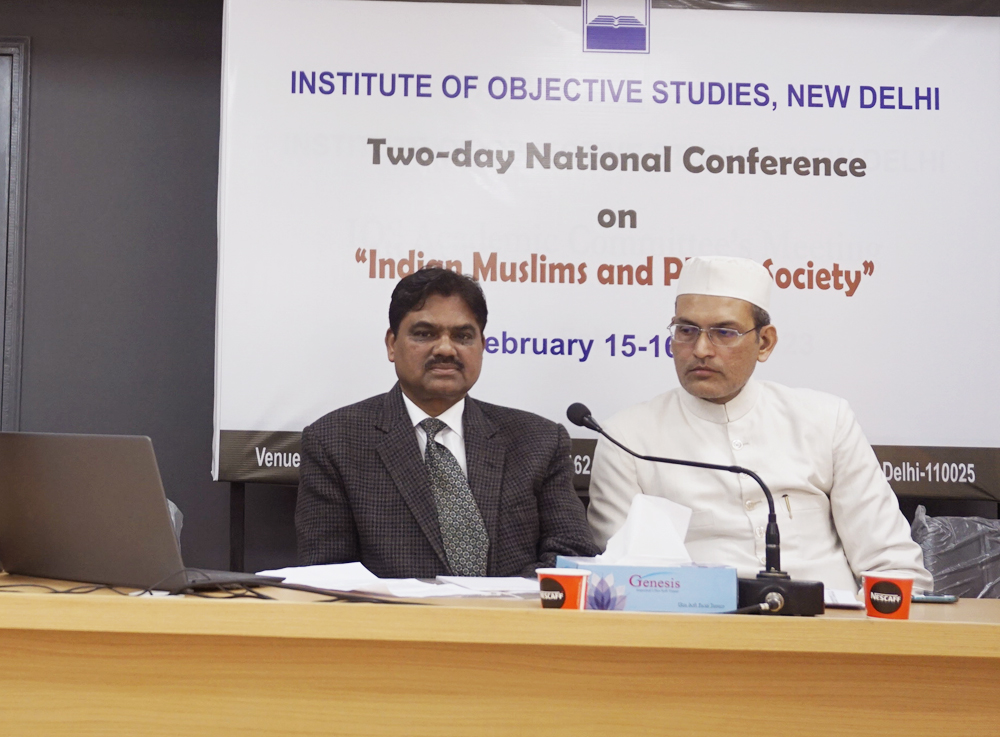
Technical Session-III
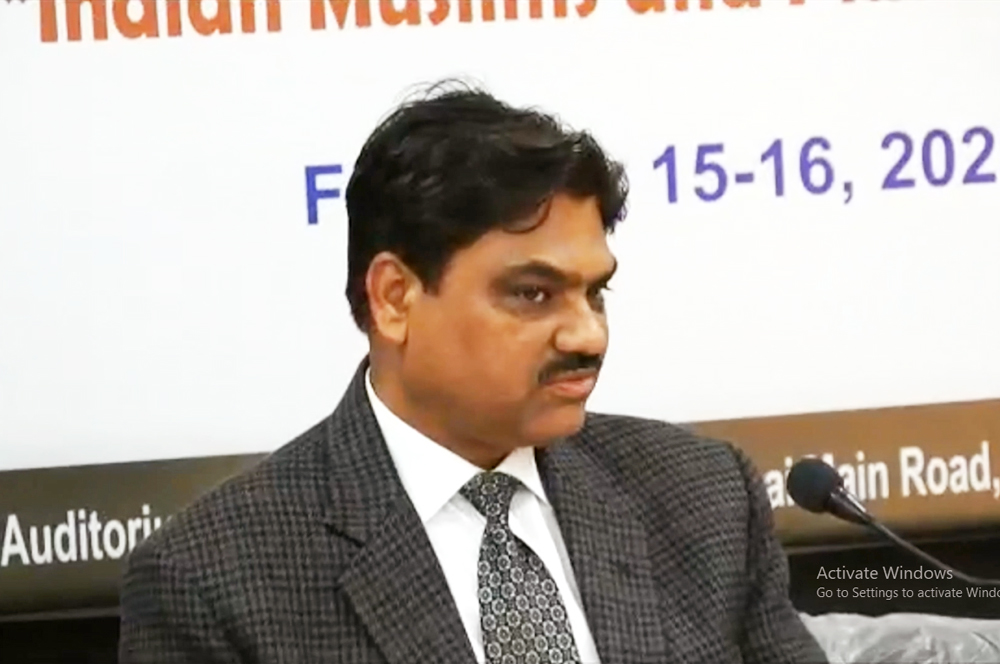
Professor Nasim Ahmad Khan, Chairman of the Department of Social Work, AMU, Aligarh, chaired the 3rd session on the theme “Contribution of Muslim in Nation Building” and stressed why every individual in the society is a part and parcel of social development, irrespective of their faith and preferences.
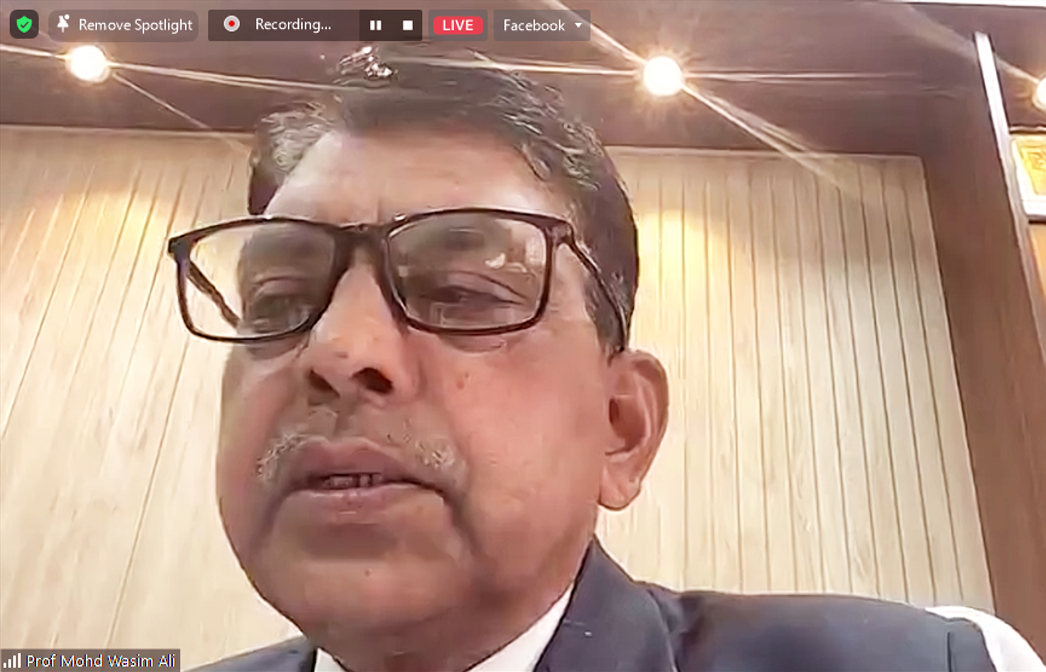
The first speaker of the session, Professor Mohd. Wasim Ali, Department of Law, AMU, Aligarh, spoke on “Sir Syed’s Perspective on Communal Harmony.” He stressed that we are passing through a difficult era when Islam as a religion is used as a means of aggression, and there are continuous attacks on it on multiple levels. He said that the current wave of aggressive nationalism is taking many lives. He emphasized that brotherhood, tolerance and humanity must exist with religious harmony. He further said that Sir Syed Ahmad Khan’s teaching on communal harmony is worth reading and incorporating into daily life. There is a division in the societies rooted in society nowadays, which must be uprooted and removed, he said.
He said that Sir Syed Ahmad Khan conveyed that any society can't prosper without an integrated approach. By nature, Sir Syed Ahmad Khan was the champion of communal harmony and practised that as well. The people of India are one nation, and all communities are its strengths. India is a country with massive diversity. The idea of India is one home concept. Sir Syed Ahmad Khan said loving the country is more critical, religious, and ethical than loving the community. He was a social reformer, irrespective of all religions. It is high time we follow Sir Syed Ahmad Khan’s ideals.
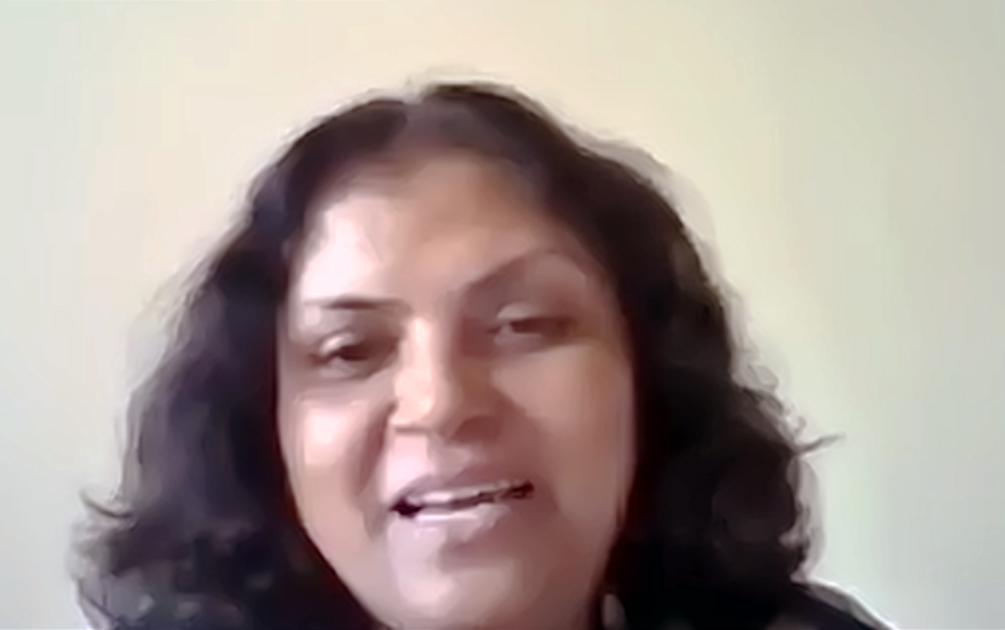
Dr. Salma Aziz, Department of Sociology, Abeda Inamdar Sr. College of Arts, Science & Commerce, Pune, highlighted how India is a pluralistic but divided society. The construction of nationhood amongst Muslims in India is the need of the hour. Each community faces challenges, but they need to appreciate pluralistic approaches. Each community should make the best of their customs and offer the most valuable form of their life. Pluralism, as a concept in the current scenario, matters the most. Muslim societies possess rigorous generosity and integrity for broad applicability. Minimal dogmas are an ardent need to define religion, she said.
She emphasized that Pluralism, as defined today, needs to be brought into perspective broadly. The experience of Muslims in India as the heritage of central Asian culture and civilisations and India’s cultural and intellectual life is a proven truth. Muslim Indians take pride in being Indian rather than migrating to Muslim Pakistan. Indian Muslims are ill-understudied and under-studied even though they are the second largest and first minority. Language, religion and caste are some of the divisions in India, but all these divisions are advocators of Pluralism, she concluded.
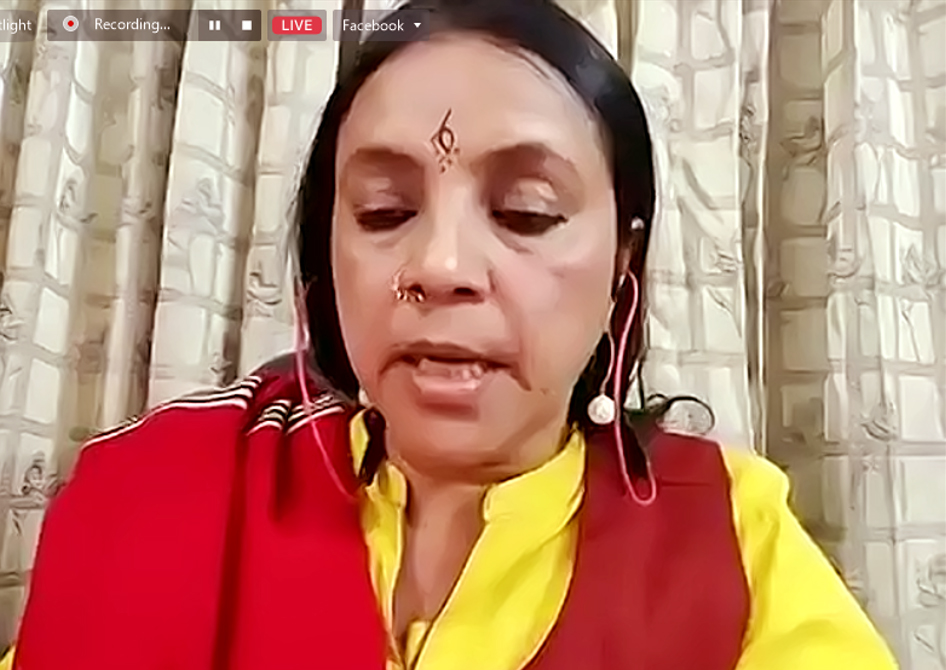
Ms. Bhasha Singh, a Delhi-based Independent Journalist and Writer, highlighted the contributions of Muslims in nation-building, which remain at par. She said that India's Ganga-Jamuni tahzeeb has been essential to sustaining the nation's secular values. Muslims played significant roles in doing so. Since 2014 though, the fabric of India's secularism has been attacked the secular spirit of the country is waning. Why would minorities always be asked to prove their nationalism? It is a fight to survive and attack them, she questioned. She greeted the Shaheen Bagh Muslim women who projected the basic concept of Indianness during CAA-NRC protest. Fatima Sheikh brought a renaissance, and that spirit was seen in Shaheen Bagh, a most significant example of democratic and constitutional upliftment after independence, as witnessed. She said that no one has the right to question another's sovereignty. Hindu fascist attacks must be countered with Intellectualism and Pluralism spirit. Muslims don't come in anger now. They don't resist, and they showcase patience. All pillars of democracy are attacked, but Pluralism always survives, she concluded.
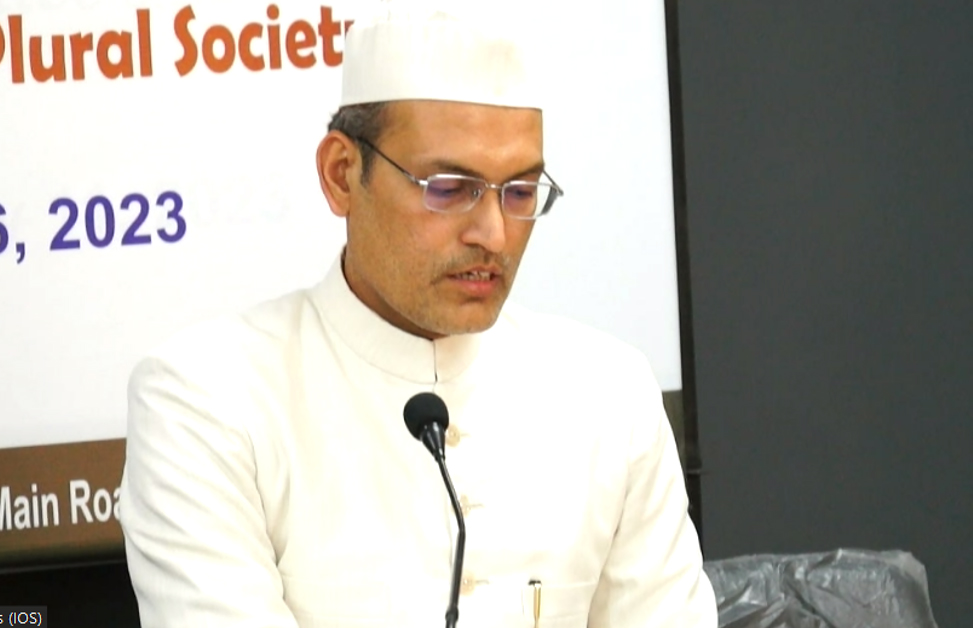
Dr. Arif Mohammad Khan from AMU, Aligarh, spoke on the topic “Policies of Government and Pluralism in India.” Acknowledging pluralism is vital for social framework, he said. The first graduate of AMU was a Hindu, so AMU has maintained its pluralistic values since its inception, he observed. He said that the current policies of the respective governments are showcasing a new way, yet more needs to be done.
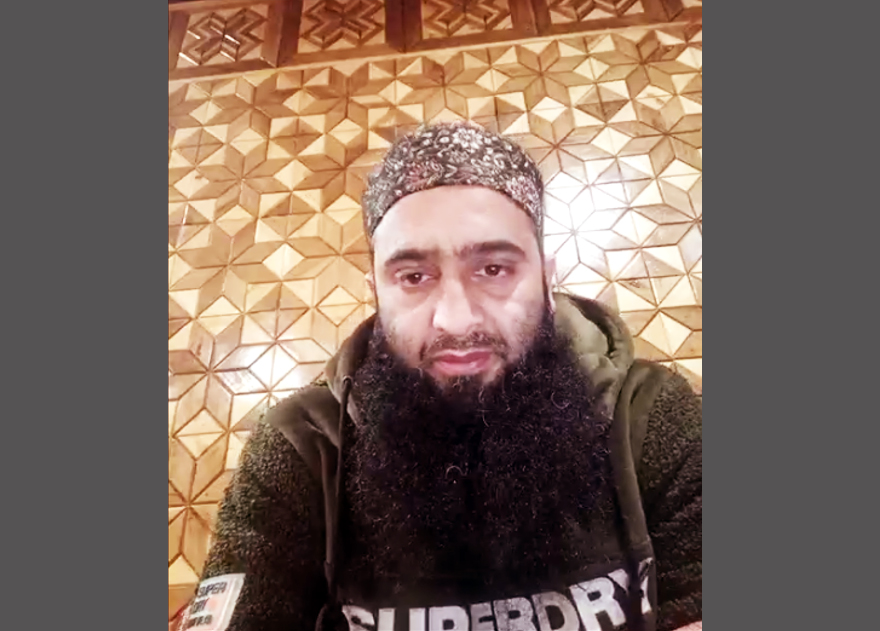
Mr. Arshid Ul Islam, Research Scholar, Education, Shri Venkateshwara University, Gajraula, U.P. spoke on the “Role of Indian Muslims in Plural India: A Study of Contribution of Sir Syed Ahmad Khan in Nation-Building.” He said India is the most plural of all countries in the world. Sir Syed Ahmad Khan, a thinker and social reformer remained a torchbearer enlightener for generations to come. His life and works remain relevant today in the context of Muslims in India and to increase Pluralism.
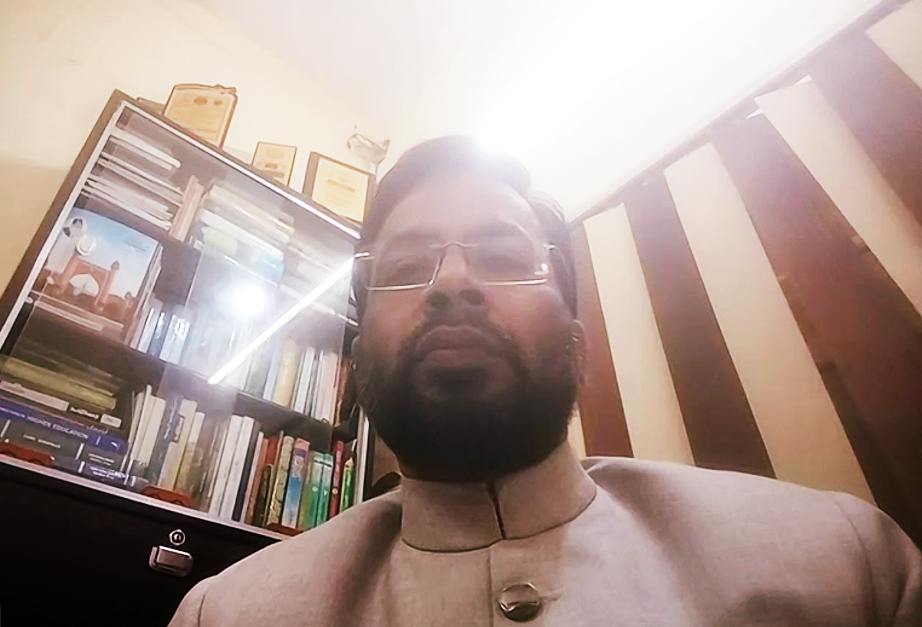
Dr. Nadeem Ashraf, Assistant Professor, Department of Sunni Theology, AMU, Aligarh, spoke on the topic, “Problems of Muslims in Plural Society.” He mentioned that the Islamic teachings & prophet’s life speaks volumes about Muslims and their characteristics. He said that Muslim minorities often face problems as minorities. Meeting typical social temperament has become a trend today. People need each-others’ help in plural societies. They need to maintain their religious identities and keep diversity right in order. He insisted that mutual harmony was the need of the hour. Focus on social relations with others is equally important. Islam offers complete freedom to mingle rather than narrow thoughts, he said.
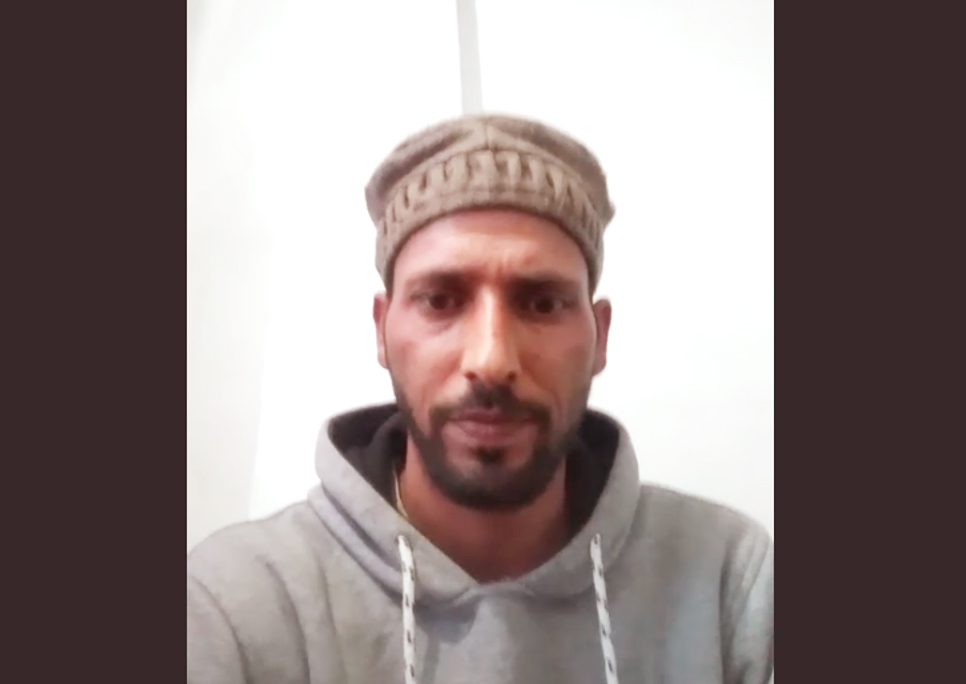
Dr. Sajad Ahmad & Dr. Rafique Anjum presented the paper entitled “Contextualising Religious Coexistence in Plural India: A Study of Maulana Abul Hasan Ali Nadvi” as the last speaker of the session. They gave a detailed life sketch of the late Maulana Abul Hasan Ali Nadvi and shed light on how Muslims are the best community and contribute to nation-building through their visionary roles and nationalistic spirit. Maulana Abul Hasan Ali Nadvi’s life and works are worth following at the current time, they insisted.
The session ended with a vote of thanks proposed by Professor Haseena Hashia.
Second Day: February 16, 2022
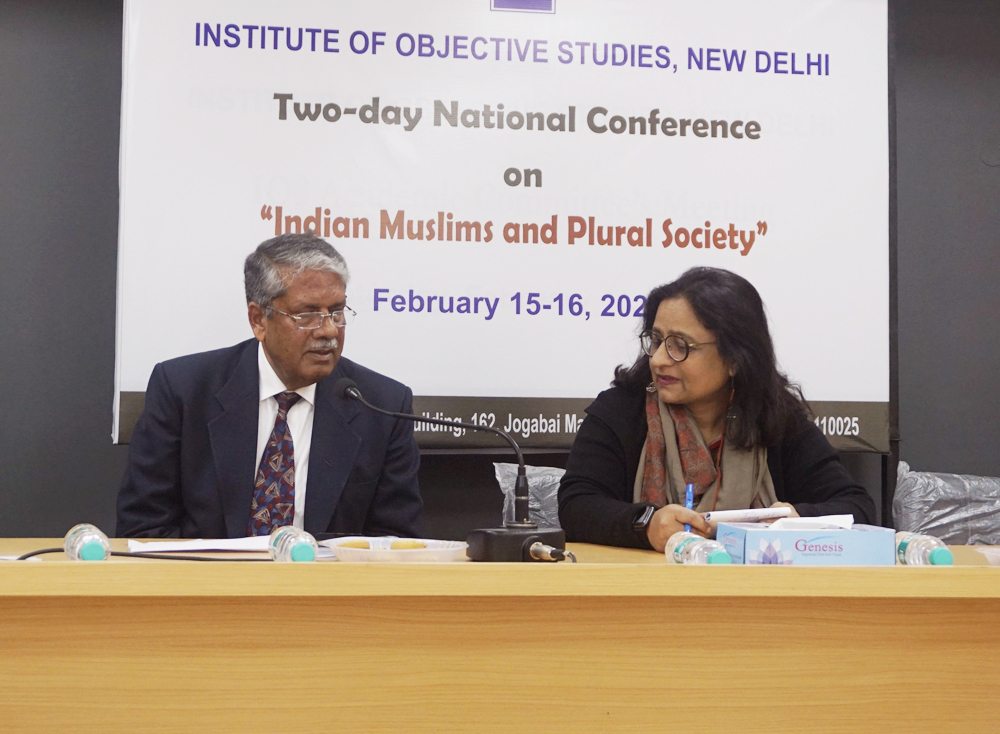
Technical Session-IV
The 4th Technical Session of the conference began with the theme, “Socio-Economic Patterns Reflecting Pluralism in India.” Moderated and Chaired by Professor M. Ishtiyaque, former Vice-Chancellor of Magadh University, Bodhgaya, and one of the expert linguistic geographers, he highlighted India's pluralism and diversity in numerous contexts. It is the most appropriate time we talk about pluralism in India today. India is vast, and its stretch reflects diversity in many respects. Variations exist in our cultures and lifestyles as well as in linguistics, he said.
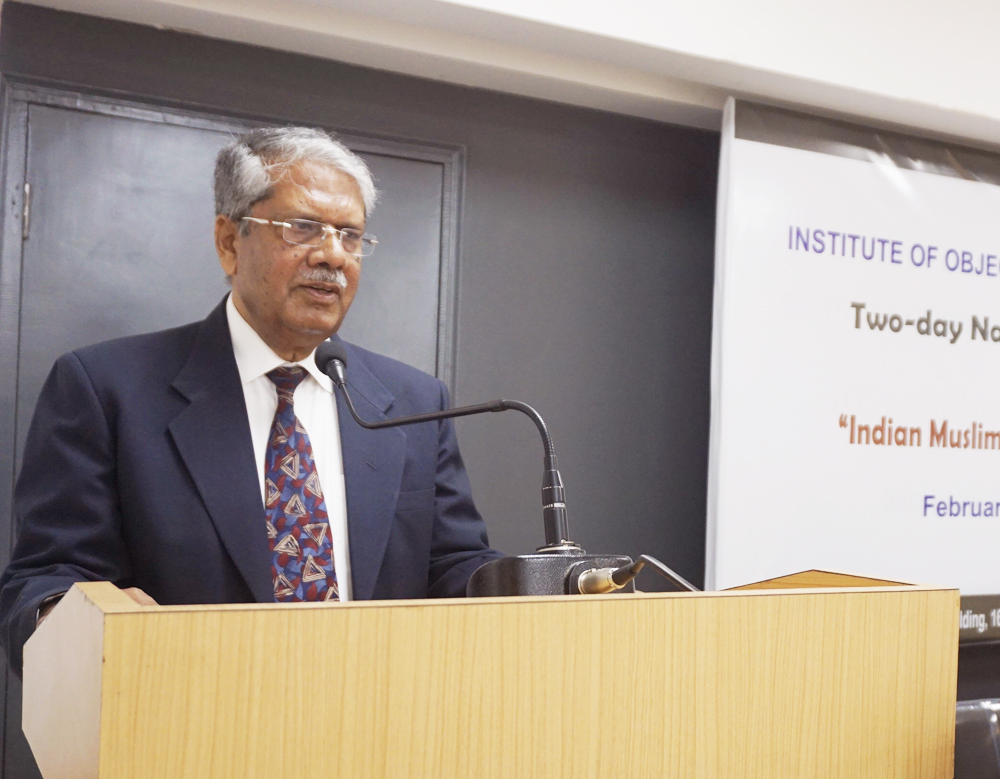
We have four major ethnic groups: Aryans, Dravidian, Tribal and Mongols, besides Negros and other smaller ethnicities, he further said. Six major religious groups, Hindus, Muslims, Christians, Sikhs, Jains and Buddhists, and many other smaller faiths, portray the pluralistic concept of the Indian subcontinent. Most religions have their sub-sects, and all of them project total Indianness. He invited speakers to present their papers.
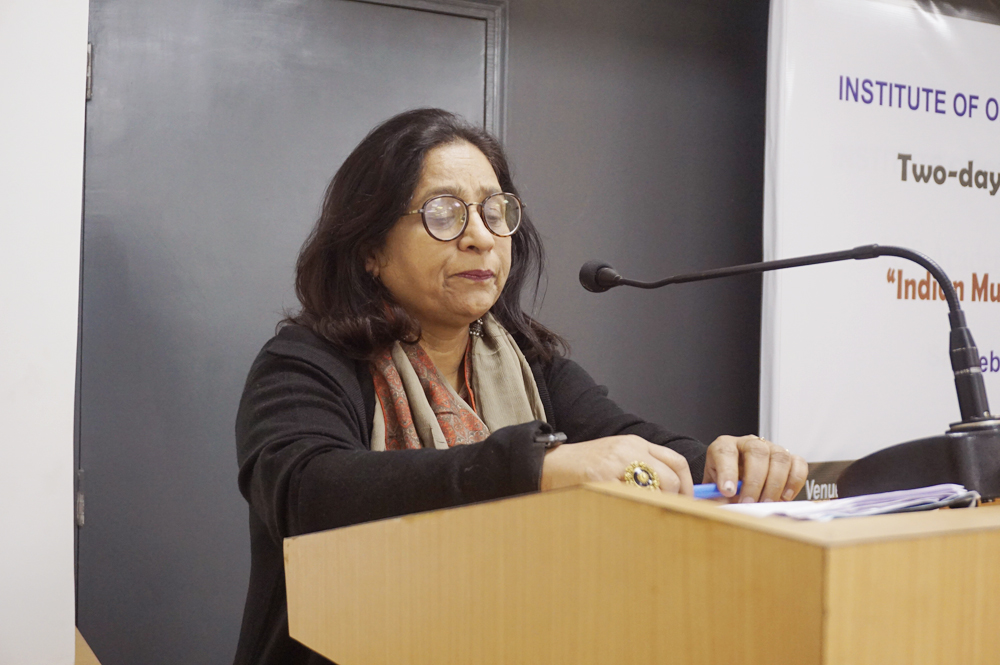
Professor Arvinder Ansari, Department of Sociology, Jamia Millia Islamia, New Delhi, spoke about the concern about how the social fabric of India has been disturbed in the current time while minorities, especially Muslims, are being marginalized. She pointed out the difference between Pluralism and Multiculturalism that needs to be understood. Let's not forget that Gandhi is not complete without Khan Abdul Gaffar Khan and several other freedom fighters and leaders of repute representing different fabrics and religious beliefs but a single patriotic spirit.
She said that India was celebrating Azadi Ka Amrit Mahotsav today, but we must equally introspect about our forefathers’ collective sacrifices, irrespective of their religious views. Are we not in a contrasting situation today?, she questioned while stating that tensions will always happen in societies, but how the state handles them is crucial.
She said that a new phase of communalism has been witnessed in recent decades. Riots before independence and those happening now have changed in perspective and motive. Shah Bano and Babri Masjid issues were those that changed the politics in India. Minorities are most often symbolized by Muslims, although there are several others too. Majority appeasement and fear of pseudo-secularism have impacted India's Pluralism.
The Sachar Committee was expected to bring significant development in politics and society, but that didn't happen, she observed. That action taken was undoubtedly substantial. The process of othering has to stop with immediate effect. Madarsa is one good thing in the Muslim community that must be focused on and promoted. There was no fear psychosis before 2014, but it entrapped the Muslim community in the last decade. We lack Muslim leadership as well. The 2019 general election results indicated as if minority Muslims hardly mattered. It’s time to think and rethink, she stressed.
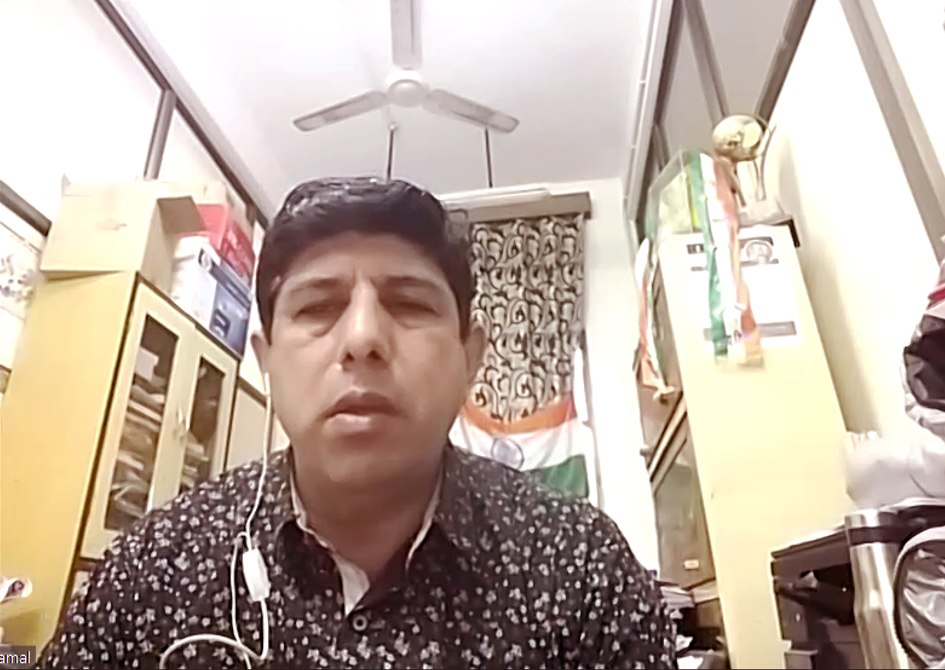
The second speaker of the Session, Professor Naved Jamal, Department of Political Science, Jamia Millia Islamia, New Delhi, mentioned that the socio-economic theory of pluralism was essential. He said that India’s cultural ethos must imbue Pluralism and Secular state elements. Muslims, as the most significant minorities, lack in their socio-economic development, he observed. The core idea of Pluralism must be incorporated at a larger scale for the country’s overall prosperity with the collective growth of all communities, he suggested. He said that several values and ethos, when becoming one, have the potential to bring newer empowerment. He further said that pluralism is coexistence, so it is time India introspects and focuses on what the founding father of the Indian constitution advocated—unity in diversity.
He stressed the need to evaluate the autonomous functional stages of all religious communities in India for the oneness that India deserves today, as it did for centuries. India is a mosaic of Pluralism. It is a land of laws, but the hour’s need is to implement them. Nothing will change unless we change ourselves, he said.
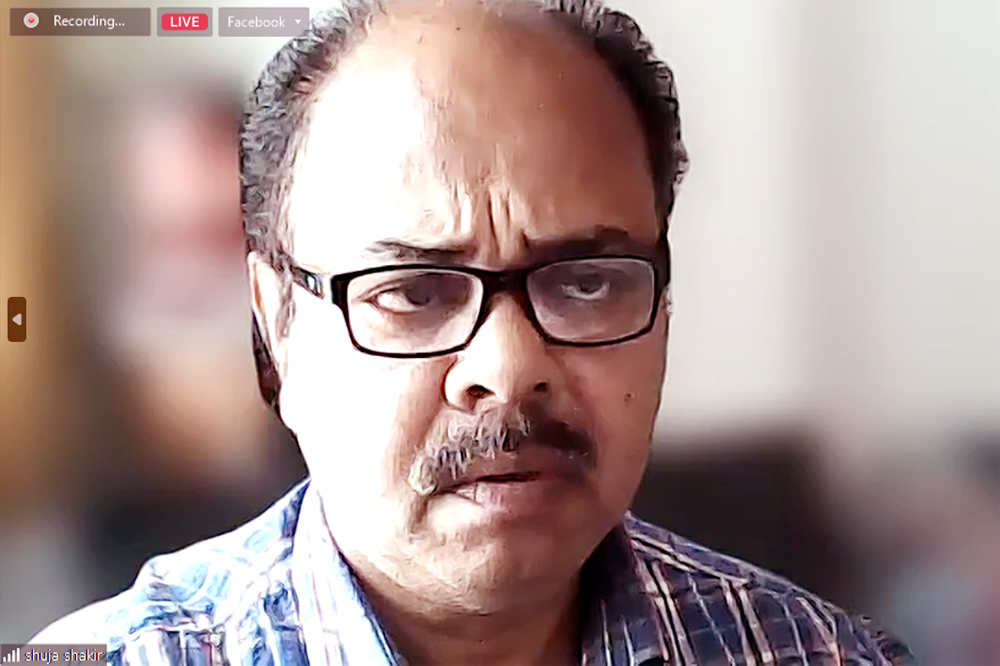
Professor Shuja Shakir, Head of the Department of Political Science, B.R Ambedkar Marathwada University, Aurangabad, mentioned that a more significant portion of Indians, irrespective of their faiths, are always against communalism. He said that pluralism was a vulnerable idea, and that iddentity politics damages the larger sections of societies and badly affects minorities.
He observed how BJP attempted Hindu votes mobilization in the name of Hindutva and attained success. Likewise, Congress made similar attempts for other communities earlier. He emphasized the need to understand pluralism and the impact of majority and minority coexistence rather than the exclusion element or the vulnerable impact of marginalization. The misinterpretation of Muslim political behaviour is already plaguing Indian societies that must be brought to the fore for discussion, he said.
Mughals never ruled India in the name of religion. The wrong notions must be defied objectively before developing any backlashing ideas. Why are Indian Muslims constantly on trial? Most political parties do lip service to Muslim issues today. There are problems among Muslims themselves that equally need to be rectified, he observed.
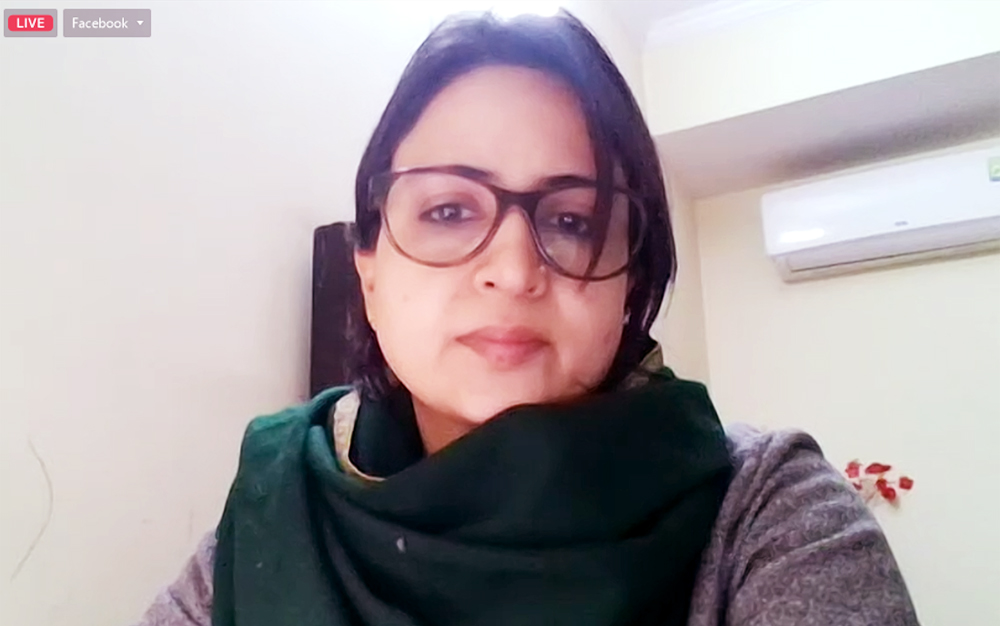
The next speaker of the Session, Dr. Nazia Khan, Department of Political Science, Jamia Millia Islamia, New Delhi, stressed that there should be accommodating factors for cultural autonomy in the country. Diversity of beliefs and practices must be given ample room for Indian pluralistic societies to survive, she said. She observed that minorities based on religion and linguistic minorities are in the question mark. How Muslims are marginalized, ostracised and discriminated against today through educational deprivation, lack of employment opportunities, etc.
She further said that Indian Muslims bear the stigma that they divided the country. Ingrained hostilities are to be blamed. Muslims are victimized in multiple ways. Intolerance towards Muslims is most often witnessed. After Sachar Committee, no government-sponsored report came for their overall development. Low education levels and low-quality education are the fate of Indian Muslims in the current context. What effect will the New Education Policy implemented in 2020 bring on Indian Muslims? Such questions must be properly looked into and answered.
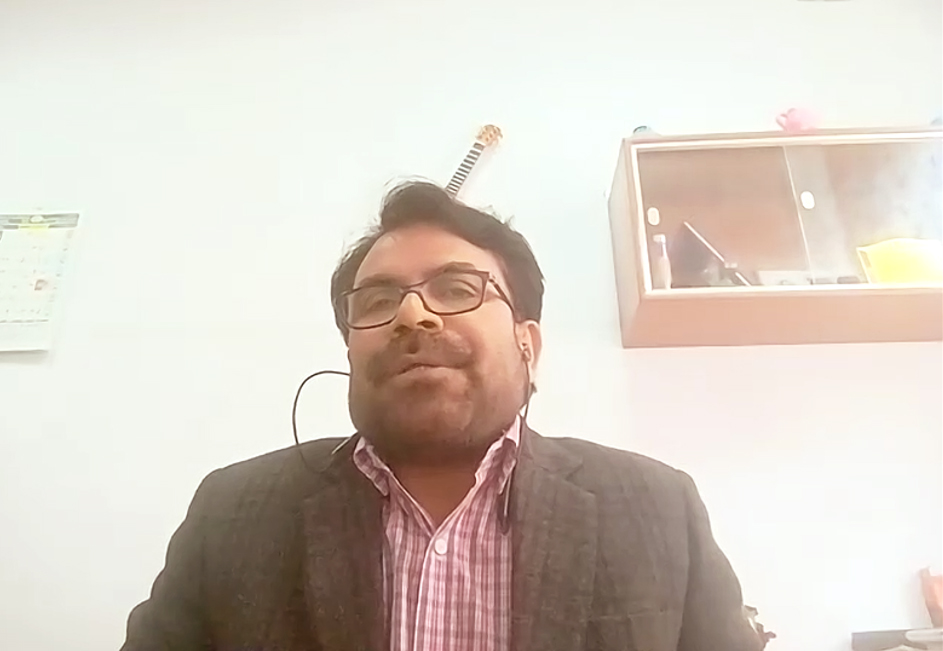
Dr. Mohammad Ajmal, Assistant Professor, School of Language Literature and Culture Studies, JNU, Delhi, spoke on the topic, “Pluralism vis-a-vis Religious Tolerance in India: The Question of Muslims.” Religious intolerance in Indian societies is one of the important questions beforehand. Religion has a sociological component in Indian diversity. State structure, multiculturalism and the rule of law in India are interconnected, he observed.
He further said that all key questions to be addressed are the causes of inclusion and exclusion in the polity, focus on the reservation and discrimination based on religion. The repeated riots in recent decades brought Muslims to the crossroads as the victims of communal violence. Hate speeches to state support for such bigots caused such scenarios. Still, there is complete Pluralism in India that must survive for sustenance, he said.
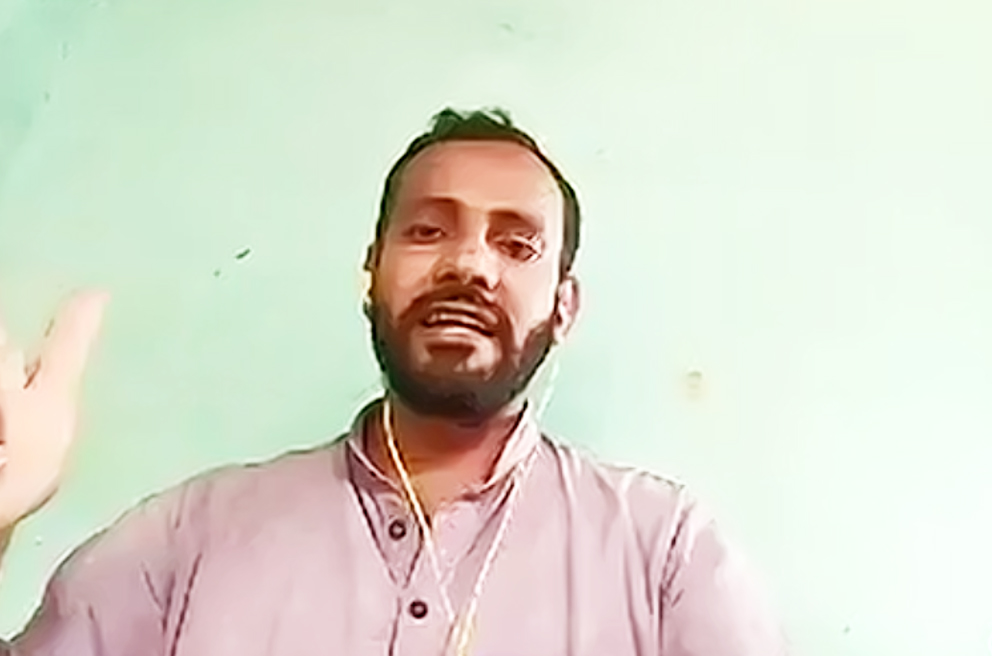
The next speaker of the Session, Mohammad Shekaib Alam, Research Scholar, Department of Political Science, IIUM, Malaysia, spoke on the topic, “The Concept of Pluralism: A Comparative Study between Islam, Hinduism and the Indian Constitution.” He mentioned that Pluralism is an acceptance of diversity. Islam, like many other religions, including Hinduism, respects the ethos of Pluralism, he said. The Qur’an and the Bhagavad Gita have beautifully described Pluralism ideas. Protection of individual rights, minority groups and various other rights, including multilingualism and secularism, is ingrained in the Indian constitution. Ironically, extremism and intolerance have been badly affecting Pluralism. They are the key questions that must be addressed.
Professor Haseena Hashia proposed the vote of thanks to end the session.
Technical Session-V
Co-Chaired by Professor Noor Ahmad Baba, Department of Political Science, University of Kashmir, and Mr. V. B. Rawat, technical session V started on the theme “Challenges and Remedies to Foster Pluralism in India.”
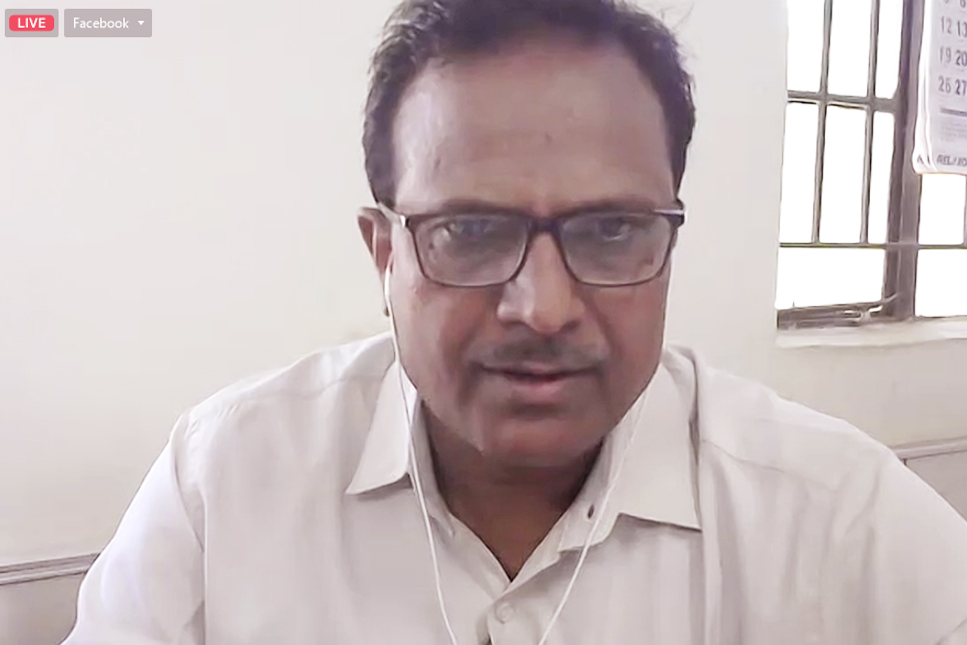
Dr. M. G. Mulla, Dean, Faculty of Commerce & Management, Abeda Inamdar Sr. College of Arts, Science & Commerce, Pune, questioned whether India needs pluralism or majoritarianism? This question needs to be replied to assess the core issues. India is indeed a land of pluralism—a political philosophy catering to various social and cultural needs of the societies concerned, irrespective of their religious faiths, he said. Majoritarianism is a perceived superiority to reclaim majorities by hook or crook at the cost of othering minorities. Ethos and concerns are that there should be equal respect for all, especially all religions, he observed.
Regular elections to elect different governments are all sources of inclusion and Pluralism. Judicial review is also a source of inclusion. The federal division of powers between central and state governments is equally crucial. The state must protect the values of Indian citizens to preserve the country's sovereignty and Pluralism, he concluded.
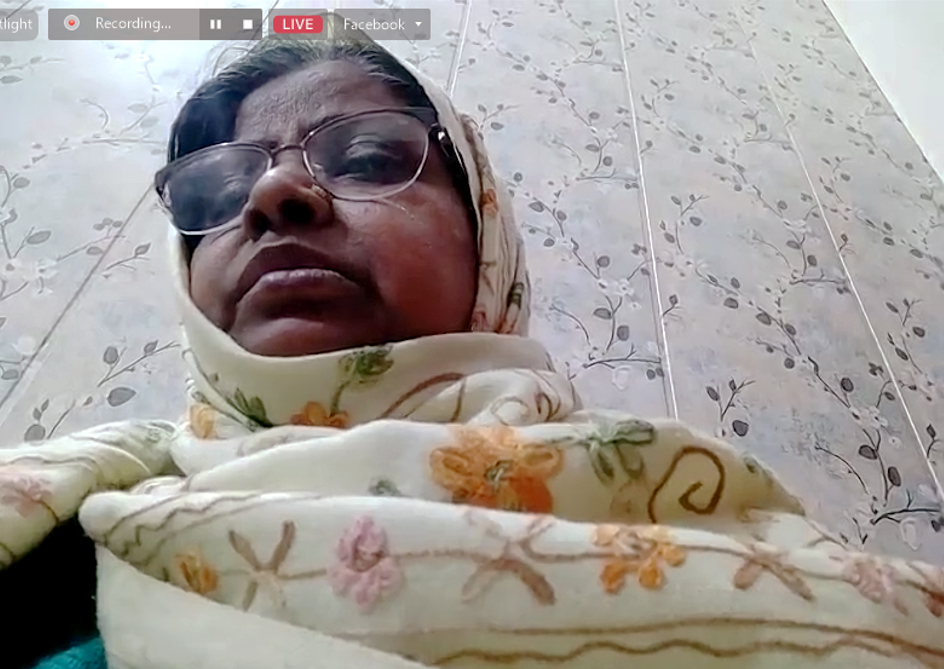
Prof. Nasrin Mujib, Chairperson, Department of Education, AMU, Aligarh, spoke with her own story of being the only Muslim in the whole class during her school days. That was the scenario in Muslim societies then, especially for women’s education a few decades ago. Girls in Muslim communities were supposed to focus more on their household activities, she observed.
There has been awareness, and lots of changes occurred in the recent past, but still, it needs to be more satisfactory. Parents need to come forward, although they have many problems to face. It is time to focus and bring thorough reform in the education system that should directly impact and bring a revolutionary change in the education system, especially for Muslim women. Liberal democracy is ardently needed in the current context. Our own efforts are the need of the hour, she insisted.
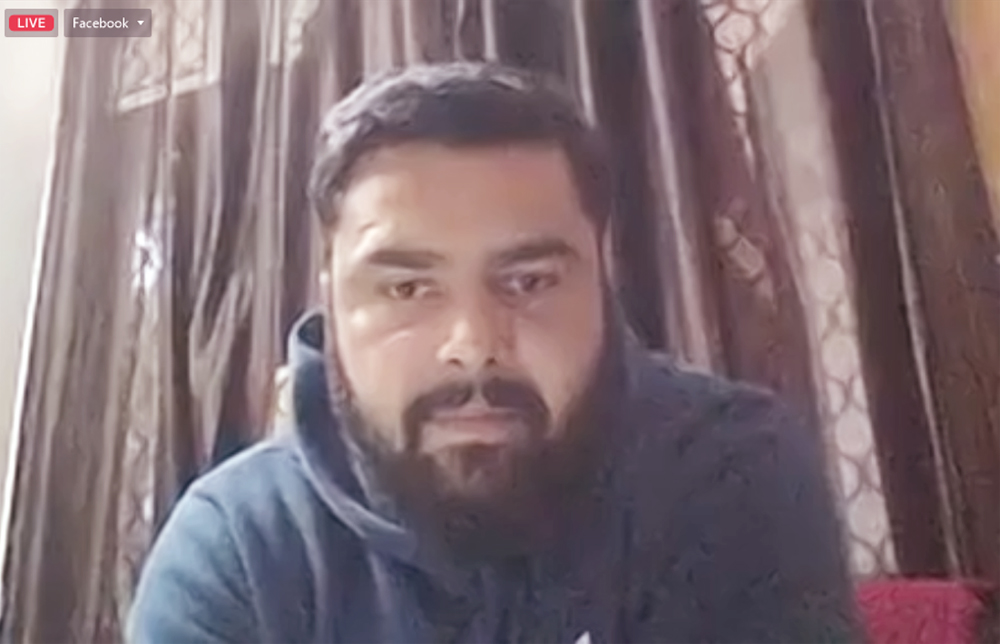
The next speaker of the Session, Sayed Bilal Haider (Habib Bilal), Research Scholar, Department of Islamic Studies, School of Islamic Studies, Baba Ghulam Shah Badshah University, Rajouri, spoke on the topic, “Religious Integrity and Intra-Faith Dialogue Among Muslims: Challenges and Prospects.” He observed that Islam's concept of pluralism is needed now as it is a beautiful aspect of diversity. A peaceful and pluralistic environment can leave an impact, especially when there is islamophobia and misconceptions are on the rise in India and globally, he said.
He observed that Islam’s concept of religious integrity must be understood in that scenario of the Prophet's migration from Makkah to Madinah. Brotherhood and integrity concept in Islam came from the very early days to maintain peace and social, religious and cultural integrity. Islam’s concept of intra-faith dialogue besides inter-faith is worth applying to avoid all sorts of disputes, he said.
He further said that Muslims today are divided on a large scale by casteism, sectarianism, and regionalism. Practising hatred and sectarianism is a big issue. The Muslim community must introspect today to eradicate the core issues and move ahead for constant growth. Racism is also one of the significant issues in the current context, and it should be ended. Muslims mustn't practice racial discrimination. There should not be hatred of regionalism as well. Most Muslims don’t read the Qur’an and thus don’t understand Islam, he concluded.
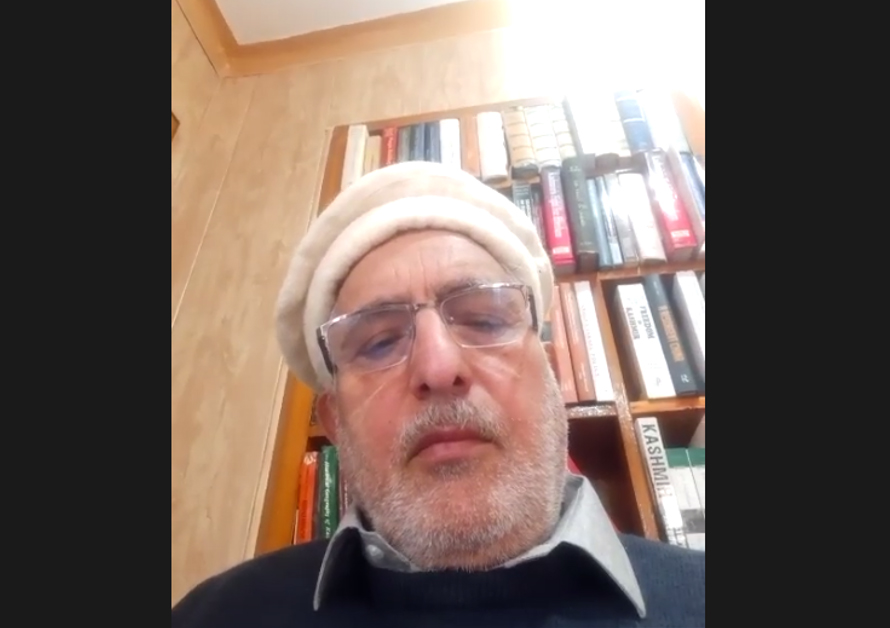
Professor Noor Ahmad Baba, in his presidential remarks said that there should not be any discrimination in society, especially among Muslims. The Ottoman empire had been excellent. Like in India, the Mughals showcased Pluralism and nation-building. India is one of the most plural societies in the world that safeguards Pluralism. It is time for further strengthening that spirit, he further said.

Mr. Vidya Bhushan concluded by saying that every religion has diversity, and that diversity must be understood.
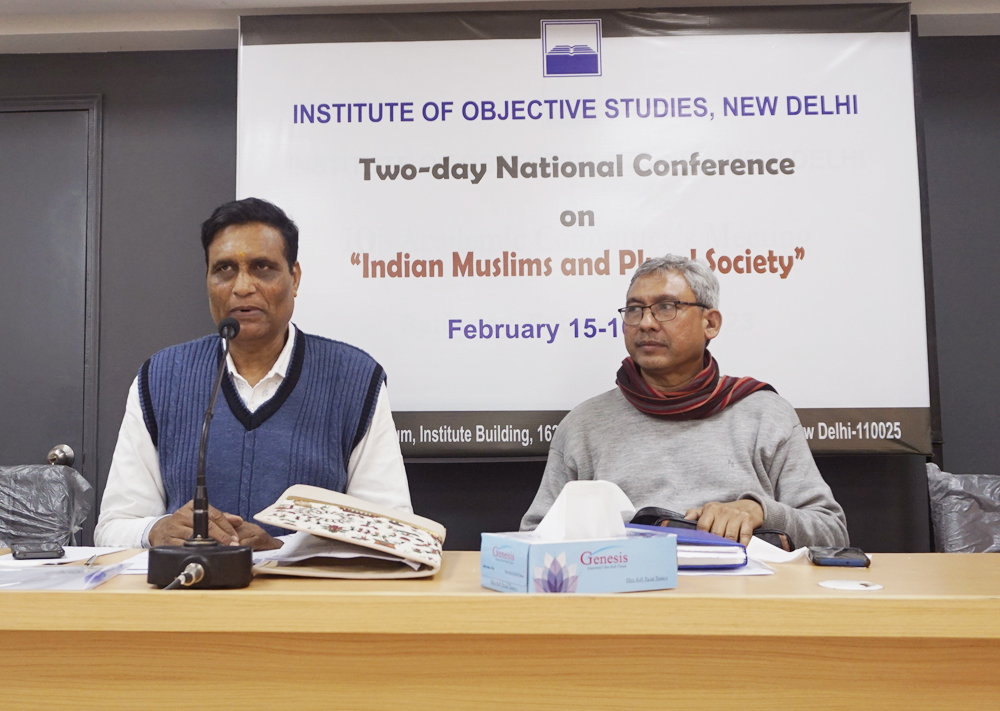
Technical Session-VI
Chaired by Professor (Dr.) Sudeep Kumar Jain, Department of Prakrit Language, Shri Lal Bahadur Shastri National Sanskrit University, New Delhi, the session began on the theme, “International Scenario, Institutional Responsibilities and Trends to Establish Synergy for Peaceful Coexistence among Nations.” While opening the session, he said that one must appreciate his/her respective religious rituals but not forget the core of humanism when practising his/her religion. He further said that one must understand what makes religion and how it describes humane spirits. When we write books, we have to think of words and thoughts as they will have a lasting impact on the readers for generations.
He further said that religion was not a so-called culture; it is the primary feeling of love and affection. Mistakes will happen, but everything has a limit. Minorities are not of power or strength but of their thoughts. There is no religion but humanity. No religion says to damage nature and the environment. Politics has caused many differences, unlike religions that advocate peace and prosperity. Self-respect and respecting others propagate humanity. All faiths teach betterment, but none of them leads to communalism.
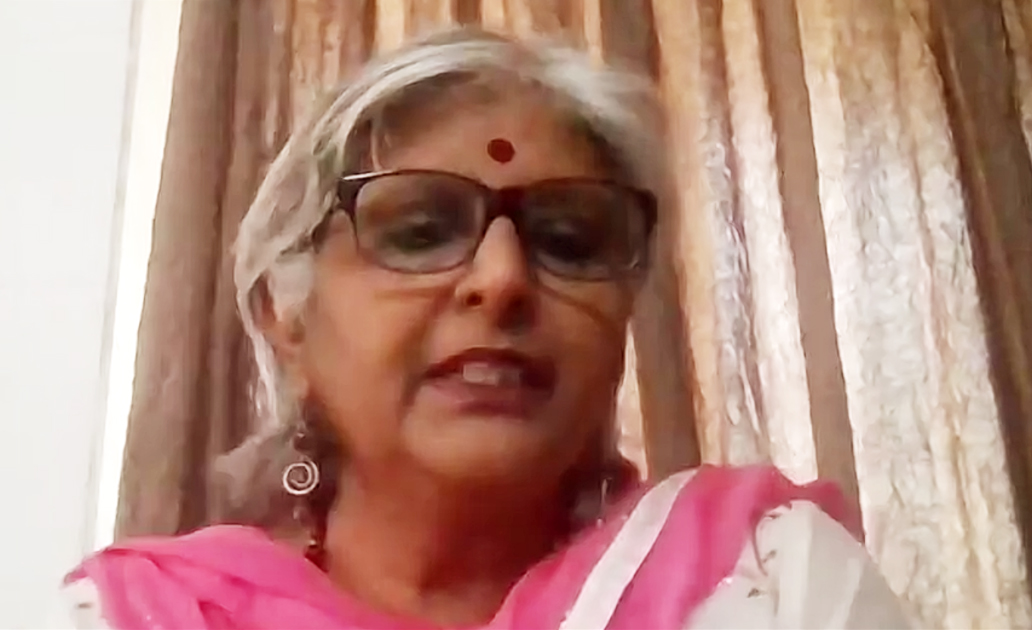
Dr. Amita Valmiki, Head, Department of Philosophy, R. J. College of Arts, Science and Commerce, spoke that “mysticism and mystical words for peaceful coexistence must be understood for thorough observation, assessment and implementation.” Religious practices and mysticism are, regardless of religion, an enormous undertaking. Mysticism is a constellation of distinctive practices for human lives. It is a knowledge-granting concept. Mystical aspects portray universality besides intellectual elements, she said.
She further stressed that the moral part of mysticism is equally focused. All kinds of mysticism bring social and communal harmony, and so do they augur for coexistence. Rabindranath Tagore was a great mystic saint of his era. Soul mysticism is all about self-repairment through bonding with god. Likewise, Sufism with Qur’anic instincts presents the best example of mysticism. Mysticism is indeed a pathway to peaceful living and coexistence.
Mr. V. B. Rawat, Author & Human Rights Activist, spoke about the utter reality of the society that even educated people are turning more racist and caste-conscious in India today, which is a somewhat more dangerous scene. Is playing with minority sentiments justified by intelligentsia?, he questioned.
He said that let us think of Kabir, Rahim, Tulsidas, Redas, Nanak and many eminent Sufis. They were less formally educated than we have opportunities to gain education today, but they used to promote coexistence more than we do now. Bigger than constitutional values, we need to focus on the feelings of coexistence. Muslims are not the minority but the second majority in India. It has to be understood in light of the facts. Parsis and Jains are though minorities, he said.
He further said that the global right wing is the outcome of international right-wing economic development. Cultural diversity in India remains incomplete without Hindus and Muslims coexistence. The crisis is created for the accumulation of wealth. Multicultural societies are always beneficial, he said.
Diversity always benefits. Gandhi, Nehru, and Azad focused on resolving secularism, social justice and respect for pluralism. We have a strong heritage and need to develop a robust constitutional mechanism. Today media is a partner in crime as it spreads hatred in societies. Autonomous institutions are a must for a strong democracy. Mandal Commission under VP Singh government in 1990 completely changed the Indian polity, he concluded.
It followed with a lively question-answer session.

Valedictory Session
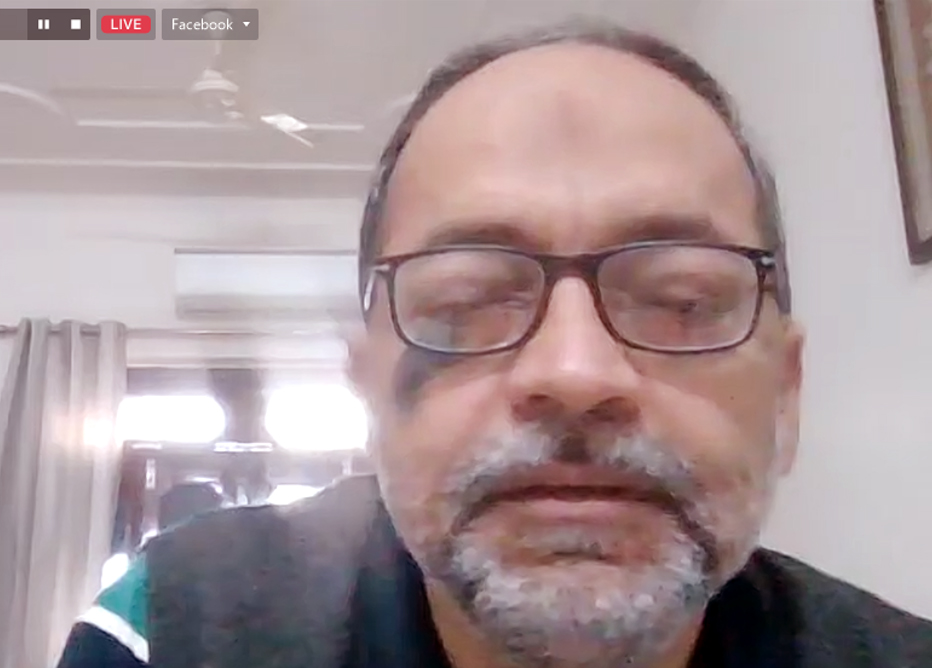
Professor Asmer Beg, Department of Political Science, AMU, Aligarh, in his speech as Guest of Honor, said that Muslims today witness political marginalization and invisibility—total invisibilization and turning worse to marginalization. Many reports and studies have documented their plights, and a lot is required to be done. Violence against minorities, especially Muslims and Christians, has been normalized recently. Media typecasting and stereotyping Muslims as perpetrators of all kinds of wrongdoings further damage their identities. Institutional apathy of Muslims keeps them at the low, he said.
He said that India is a robust democratic system, at least in the 3rd World. All countries in Europe are mono-cultural. They are linguistic states instead. India is otherwise multicultural democracy. Its democracy is flexible; thus, problems are also coming before it. Emotive politics in India is damaging the country's multicultural fabric. Religion and caste etc., play critical roles in this. It shifts people from real issues to petty issues. Emotive issues are for emotional satisfaction; thus, they can't fulfil our needs, he elaborated.
Majoritarianism in communal politics is other factor, including minority appeasement. Sense of victimhood is assuaged in the majority of communities. Emotional satisfaction is urged for significant damages that people hardly notice. Rationalism is the core of secularism—but it is defined in the context of religion instead. There is a need to redefine this concept, he emphasized.
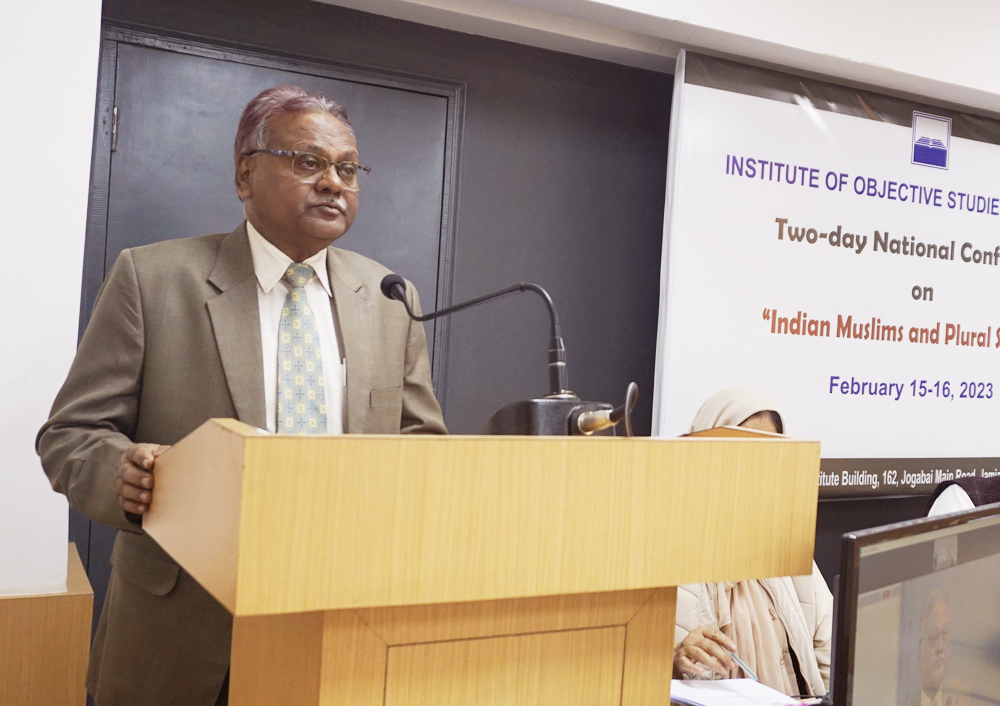
In the Valedictory Address, Professor Eqbal Hussain, Dean, Faculty of Law, Jamia Millia Islamia, New Delhi, said, “unity in diversity must be understood in its historical context.” He said, India has welcomed people from various cultures from different locations worldwide for centuries. Indian composite culture of today is a mosaic of cultures due to multiculturalism proliferation. The Indian Constitution recognizes social democracy and fraternity. Fraternity remained one of the cruces of pluralistic societies, but ironically, it has been turning hollow nowadays.
The British rulers targeted Muslims before independence. And after that, Muslims are most often targeted to face several unforeseen problems in national life today. Some difficulties are related to their own mistakes, and some are deliberately kept in the limelight due to the past mistakes of their forefathers. It is time to resolve such issues with a determined, incredible mind and balanced way, he suggested.
We have a vibrant judiciary in India, but these days they, too, are often politically motivated. We still have a deep foundation of secularism in the country that can be reignited with trust and commitment, he concluded.
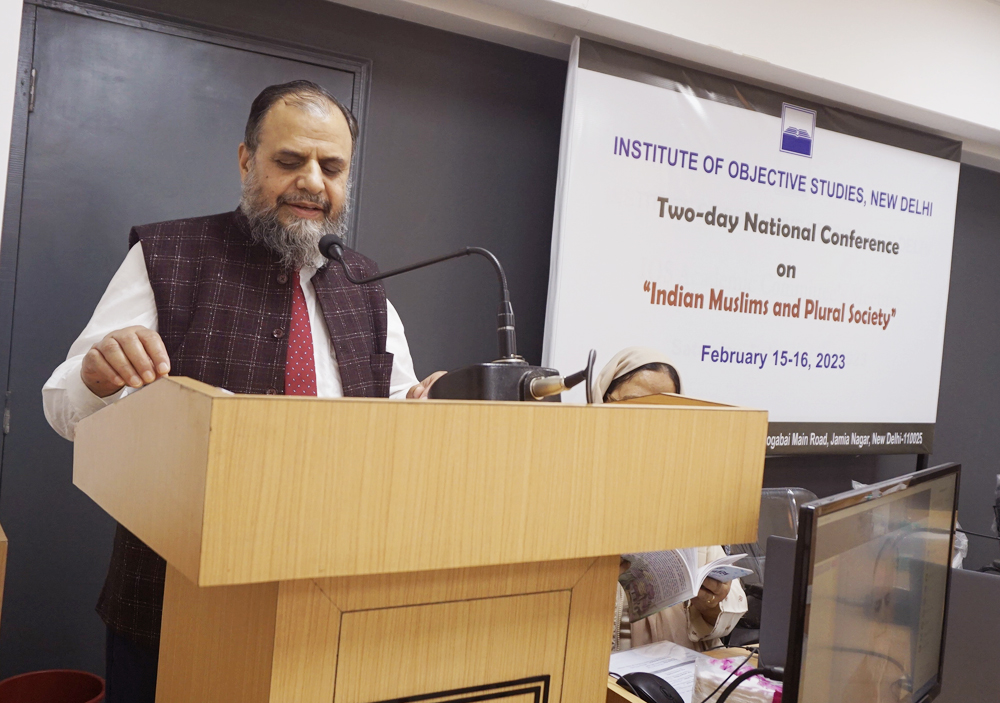
Professor M. Afzal Wani, Vice Chairman, IOS, in his presidential address said “we have had a descriptive type of narration in the two-day conference by various scholars with numerous experts. Now the need is to think another way and come up with a new dawn. More than narrating plights, we need to focus on the solutions. It is the time to value humanity and not the way of treating difficulties. Caring for each other and even caring for a single person is essential, he stressed.
He said that character building is the most crucial aspect to focus on and take action. It is the strength of faith to face the challenge and find solutions rather than lament. There is hardly any need to rise against anybody but against violence and for dignity and self-esteem.
United Nations has 17 goals for 2030, especially the broader ones like no poverty, full justice and much more. Let's make people accountable that if someone is doing wrong, they are going against the tide and the UN goals for universal peace. It’s time to follow the UN agenda from a broader perspective. The opponent of your agenda should be made accountable. Those harming the agenda of peace must be taken into account, he insisted.
He further said that serving human values is always crucial. Indian Muslims must follow the agenda of teaching philosophy, sociology, political principles and much more they have been supposed to do for the last 14 centuries. Leadership has to come. We used to guide stars, but today we don't have leadership because we are weeping in our pains and not coming out of it.
We have internal challenges as well, but we need to come up to overcome issues. We must work on gender justice and many more with firmness and determination. Indian Muslims must move ahead more methodologically. They must be protected, honoured and respected. If you prioritize faith as a Muslim, you will be better able to follow humanism. You have to have the potential to ask questions. That will make plurality when feeling for others’ pains an attribute of true Muslims is supposed. Plurality is indeed recognizing others’ dignity, he noted.
Devil is the only enemy that trains you to cheat and deprives you of being a philanthropist to your neighbour. Supporting others is the first feeling of Pluralism that Islam teaches. Don't tell people to convert to Islam but let's project a character that shows why a Muslim be given a chance to serve humanity, he said.
“Such a towering message should go to the world. Making intellectual efforts is the need of the hour. The Muslim community needs to do their accreditation for their roles” he further said.
IOS is strategically based on the Indian Constitution's ideals. This Institute will undoubtedly keep the Constitution in its spirit for social justice and human sustenance. It is time Muslims apply the Reformative Theory of Crime in their lives. What IOS is doing with its innumerable efforts must come to the UN's notice as it is advocating the latter's broader goals, he concluded.
In the context of the current scenario when all communities in India must advocate pluralism and peaceful coexistence, a 6-point resolution, moved by Professor Haseena Hashia, was unanimously adopted by all the participants. This resolution reads as follows:
- India is a Plural Society possessing a common heritage, shared values, shared vision and shared destiny, and all the people should strive to maintain this character of the country.
- India's Constitution enshrines common heritage and shared values which must be propagated to all levels of society.
- Islamic values have prioritized legal and social acceptance of diversities which must be followed and communicated to clarify its understanding.
- India’s Muslims and their socio-cultural attributes have contributed to pluralism which must be significantly propagated to defy false claims.
- India's plural reality and peaceful coexistence face many challenges and turbulence that must be met with more compassion and steadfastness.
- The conference calls for more vigorous efforts to make the constructive and constitutional narrative prevail, upholding the values of nation-building, democracy, federalism, pluralism, peace and solidarity.
The conference was concluded with a vote of thanks proposed by Professor Haseena Hashia, Assistant Secretary General, IOS.
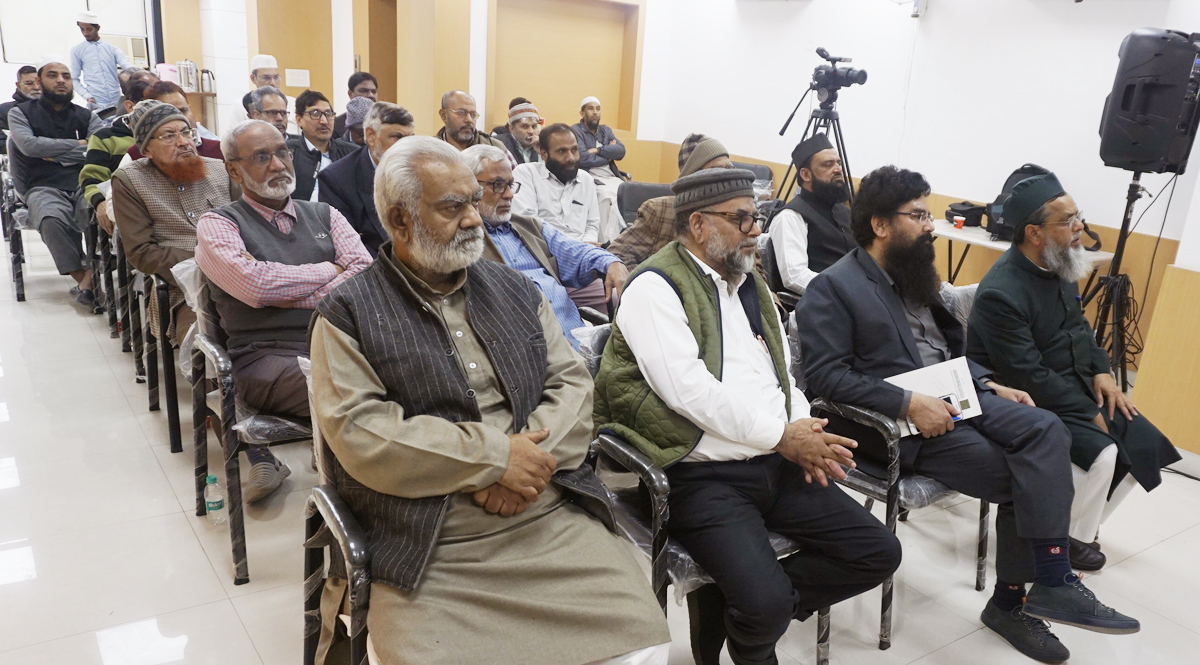
A view of audience
Go Back